Around the World in Eighty Days
by mik1264
1 | Introduction to India
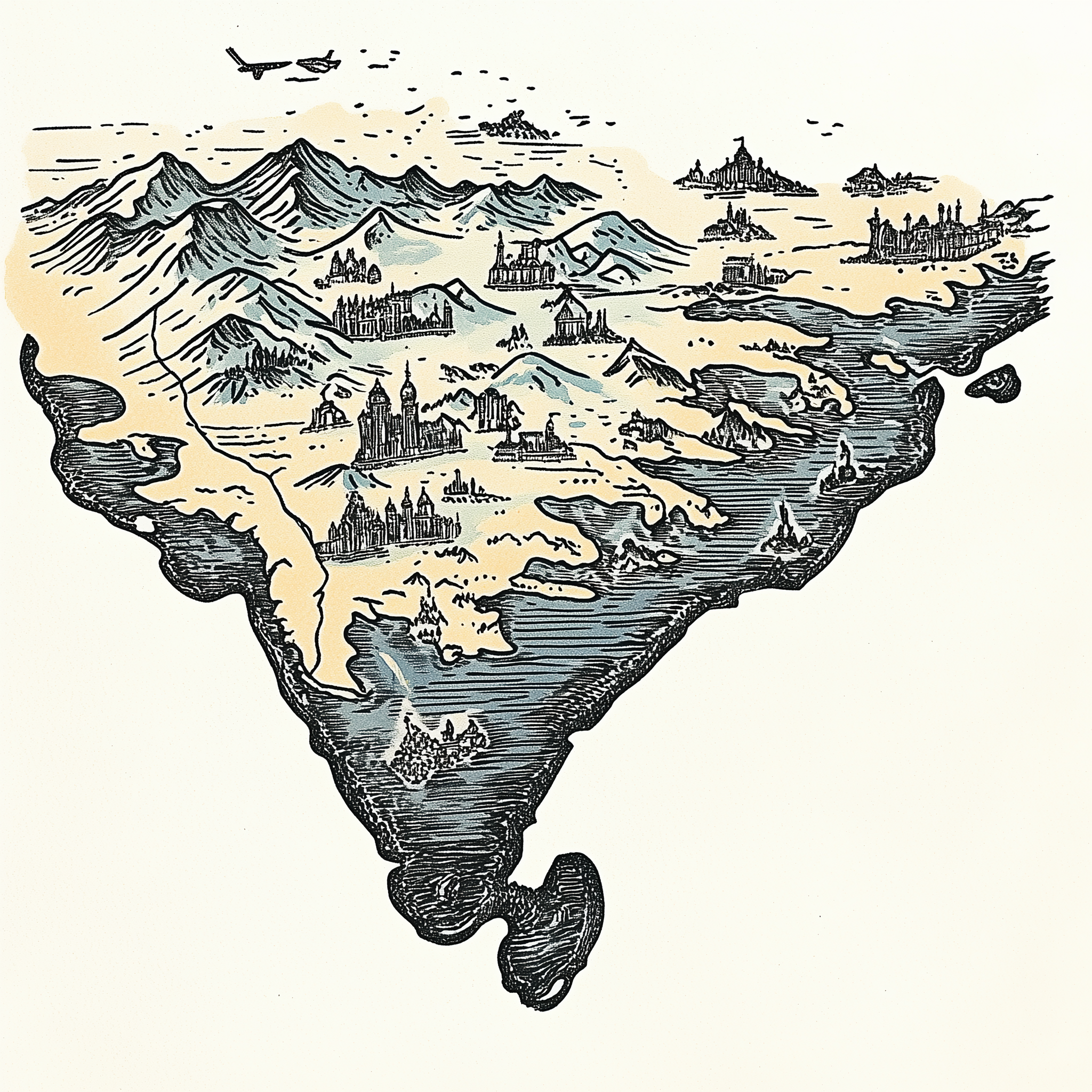
Everybody knows that the great reversed triangle of land, with its base in the north and its apex in the south, which is called India, embraces fourteen hundred thousand square miles, upon which is spread unequally a population of one hundred and eighty millions of souls. The British Crown exercises a real and despotic dominion over the larger portion of this vast country, and has a governor-general stationed at Calcutta, governors at Madras, Bombay, and in Bengal, and a lieutenant-governor at Agra.
2 | British India and the East India Company
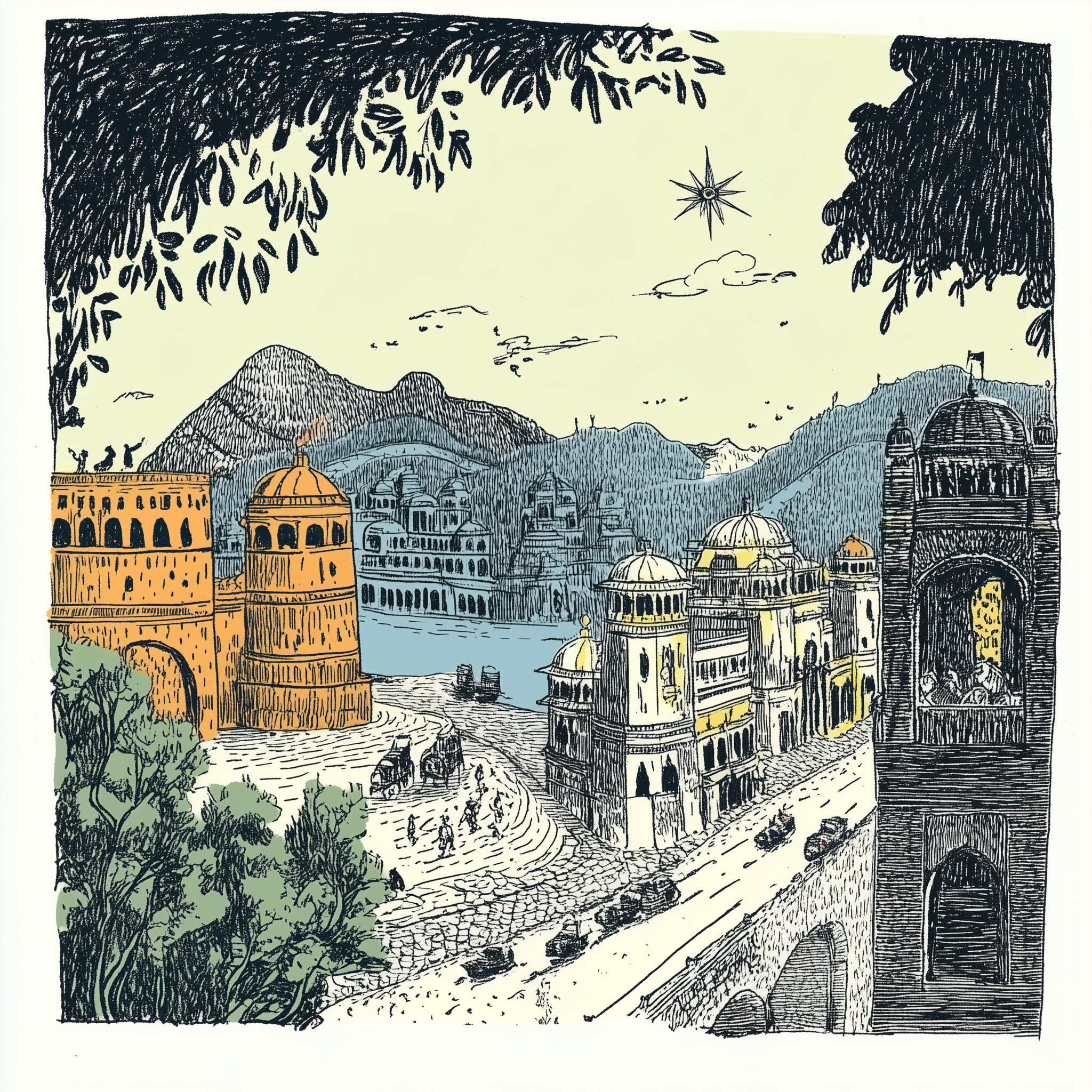
But British India, properly so called, only embraces seven hundred thousand square miles, and a population of from one hundred to one hundred and ten millions of inhabitants. A considerable portion of India is still free from British authority; and there are certain ferocious rajahs in the interior who are absolutely independent. The celebrated East India Company was all-powerful from 1756, when the English first gained a foothold on the spot where now stands the city of Madras, down to the time of the great Sepoy insurrection. It gradually annexed province after province, purchasing them of the native chiefs, whom it seldom paid, and appointed the governor-general and his subordinates, civil and military. But the East India Company has now passed away, leaving the British possessions in India directly under the control of the Crown. The aspect of the country, as well as the manners and distinctions of race, is daily changing.
3 | Travel in India and the Great Indian Peninsula Railway
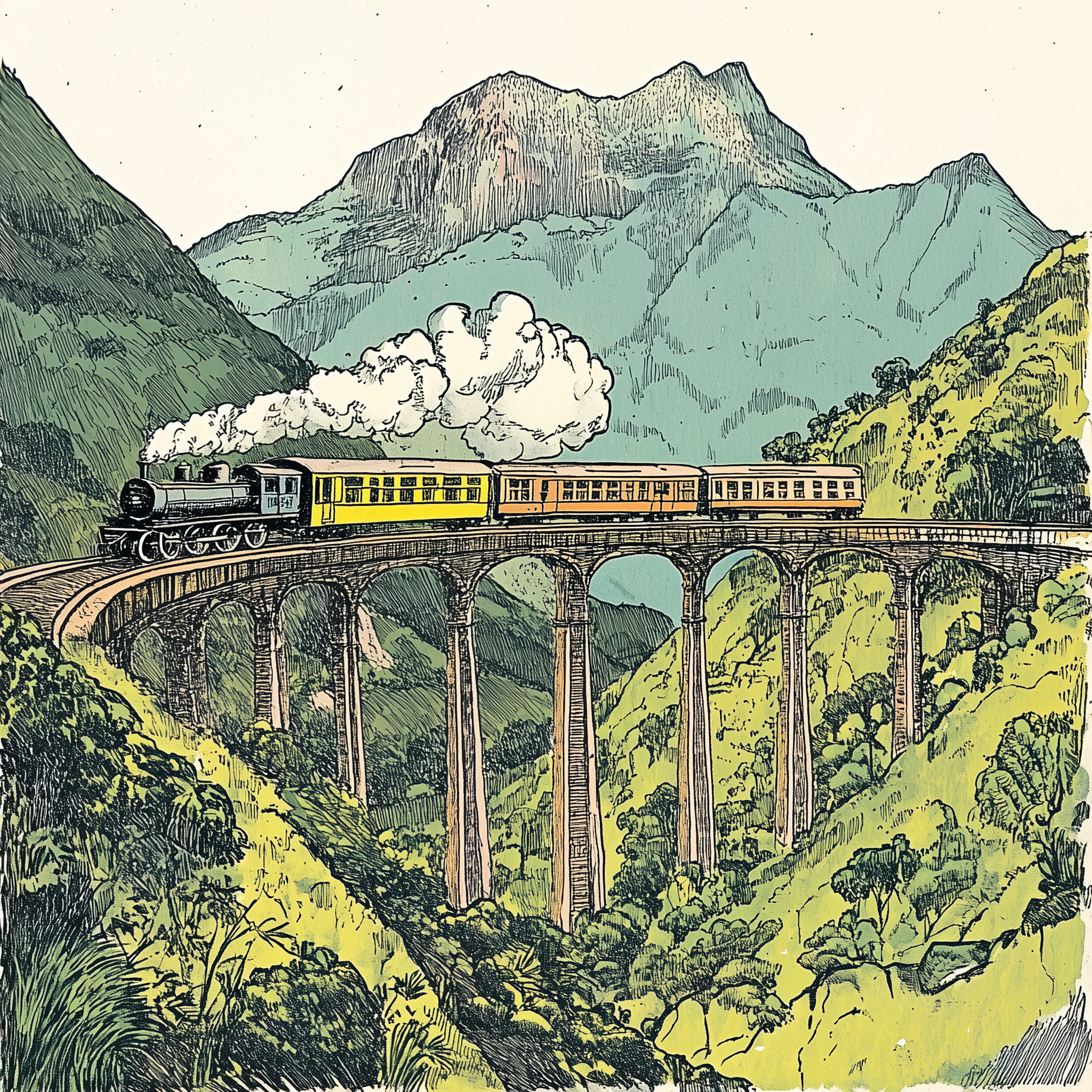
Formerly one was obliged to travel in India by the old cumbrous methods of going on foot or on horseback, in palanquins or unwieldy coaches; now fast steamboats ply on the Indus and the Ganges, and a great railway, with branch lines joining the main line at many points on its route, traverses the peninsula from Bombay to Calcutta in three days. This railway does not run in a direct line across India. The distance between Bombay and Calcutta, as the bird flies, is only from one thousand to eleven hundred miles; but the deflections of the road increase this distance by more than a third.
The general route of the Great Indian Peninsula Railway is as follows: Leaving Bombay, it passes through Salcette, crossing to the continent opposite Tannah, goes over the chain of the Western Ghauts, runs thence north-east as far as Burhampoor, skirts the nearly independent territory of Bundelcund, ascends to Allahabad, turns thence eastwardly, meeting the Ganges at Benares, then departs from the river a little, and, descending south-eastward by Burdivan and the French town of Chandernagor, has its terminus at Calcutta.
4 | Mr. Fogg's Arrival in Bombay
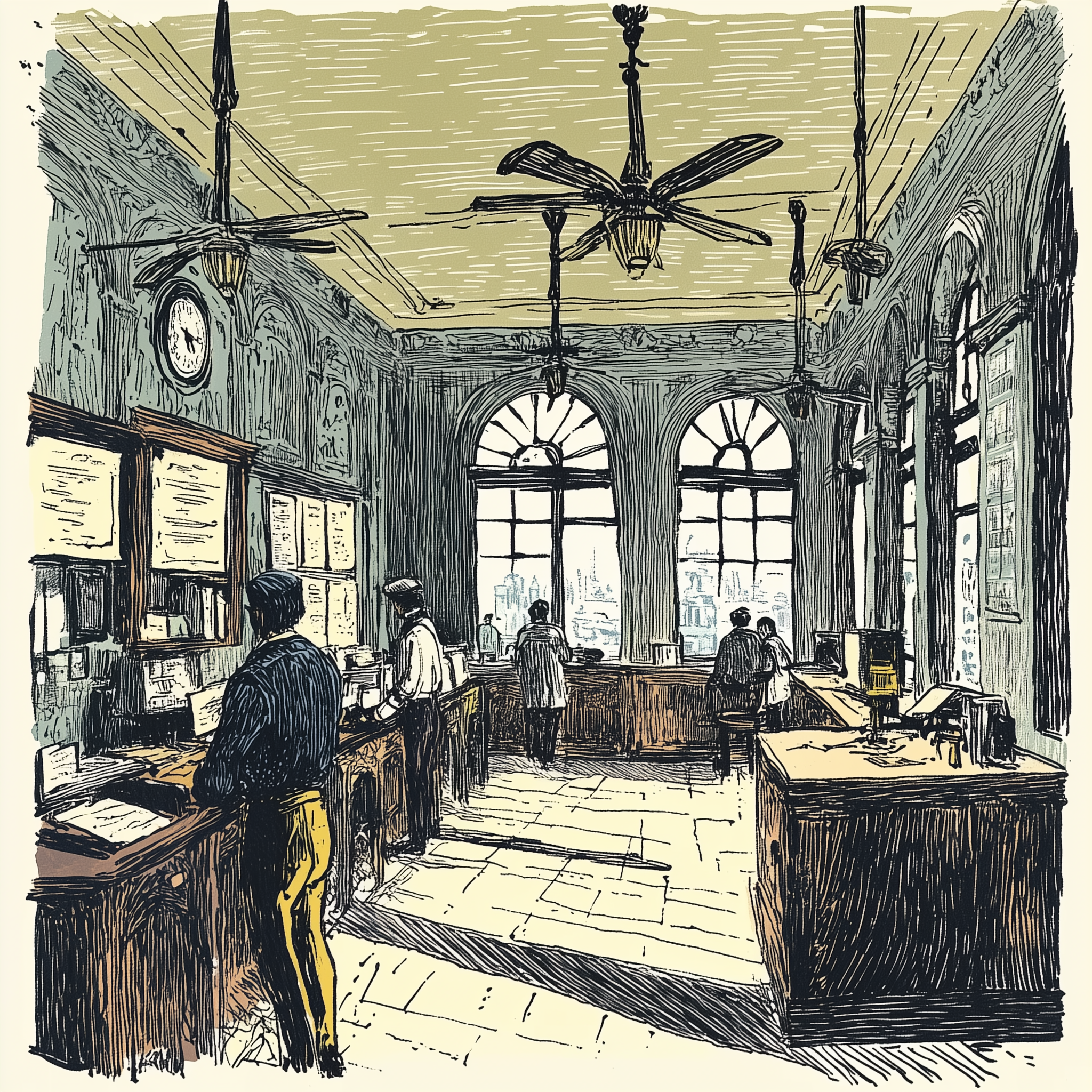
The passengers of the “Mongolia” went ashore at half-past four p.m.; at exactly eight the train would start for Calcutta.
Mr. Fogg, after bidding good-bye to his whist partners, left the steamer, gave his servant several errands to do, urged it upon him to be at the station promptly at eight, and, with his regular step, which beat to the second, like an astronomical clock, directed his steps to the passport office. As for the wonders of Bombay—its famous city hall, its splendid library, its forts and docks, its bazaars, mosques, synagogues, its Armenian churches, and the noble pagoda on Malabar Hill, with its two polygonal towers—he cared not a straw to see them. He would not deign to examine even the masterpieces of Elephanta, or the mysterious hypogea, concealed south-east from the docks, or those fine remains of Buddhist architecture, the Kanherian grottoes of the island of Salcette.
5 | Mr. Fogg's Dinner and Conversation with the Landlord
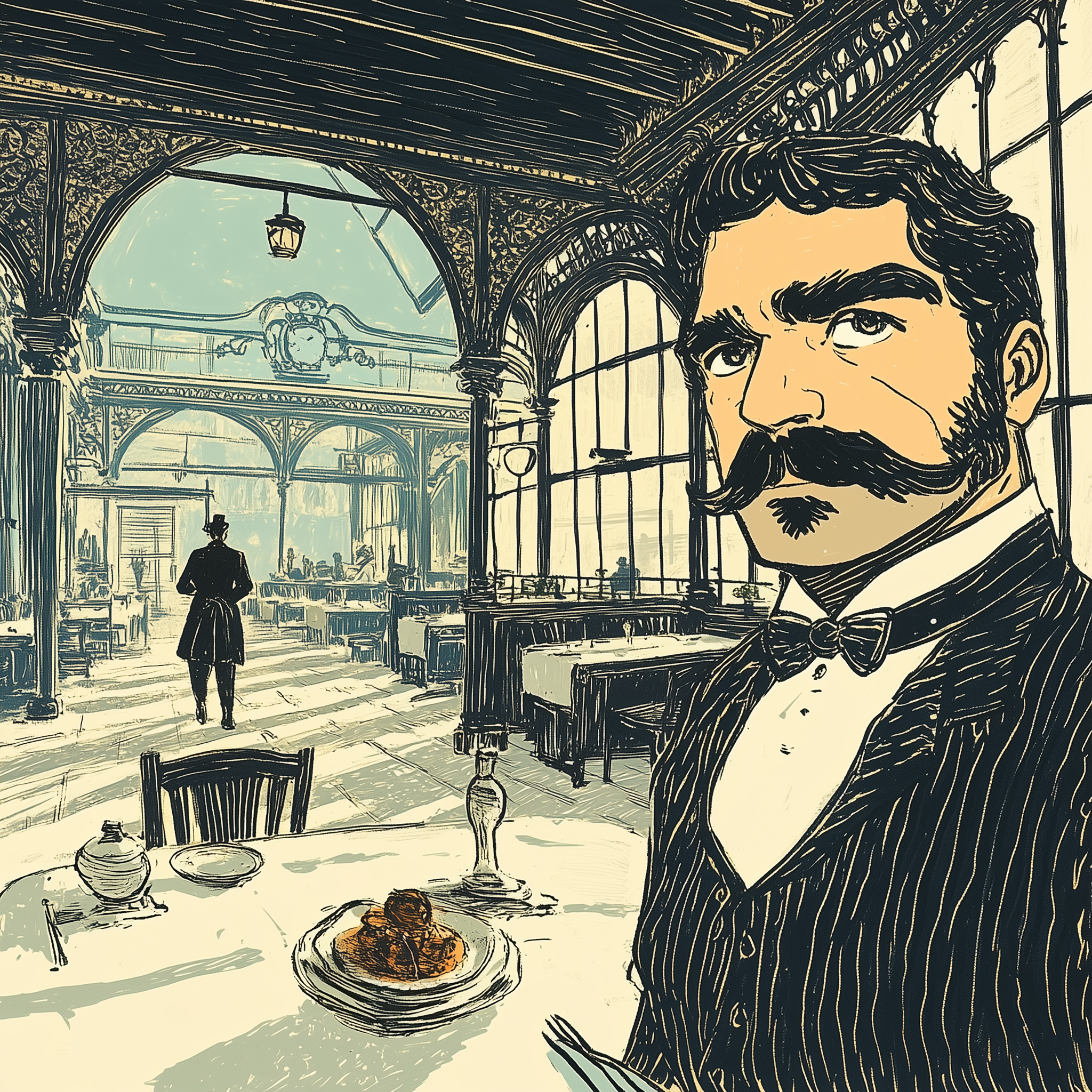
Having transacted his business at the passport office, Phileas Fogg repaired quietly to the railway station, where he ordered dinner. Among the dishes served up to him, the landlord especially recommended a certain giblet of “native rabbit,” on which he prided himself.
Mr. Fogg accordingly tasted the dish, but, despite its spiced sauce, found it far from palatable. He rang for the landlord, and, on his appearance, said, fixing his clear eyes upon him, “*Is this rabbit, sir?*”
“*Yes, my lord,*” the rogue boldly replied, “*rabbit from the jungles.*”
“*And this rabbit did not mew when he was killed?*”
“*Mew, my lord! What, a rabbit mew! I swear to you—*”
“*Be so good, landlord, as not to swear, but remember this: cats were formerly considered, in India, as sacred animals. That was a good time.*”
“*For the cats, my lord?*”
“*Perhaps for the travellers as well!*”
After which Mr. Fogg quietly continued his dinner.
6 | Fix's Actions in Bombay
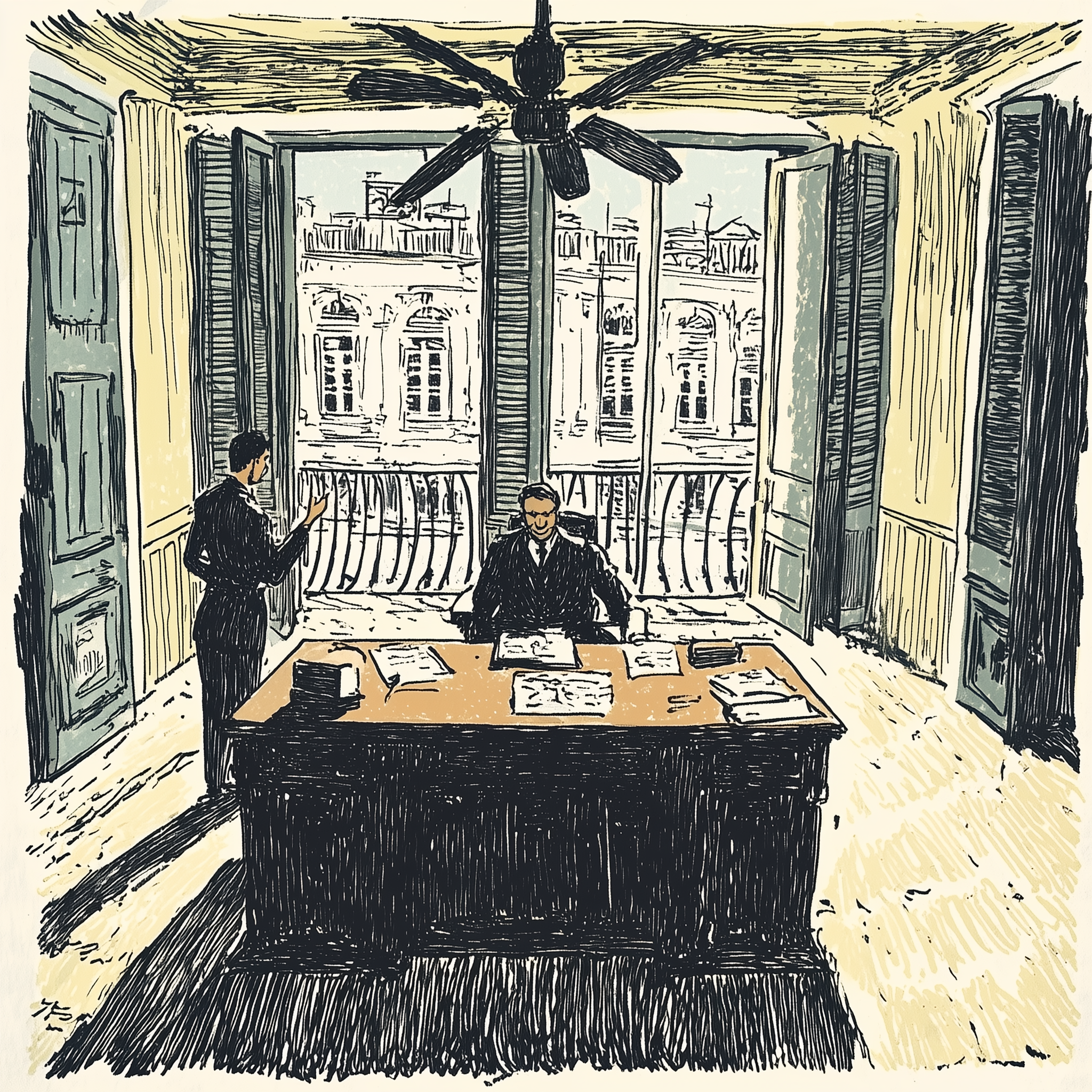
Fix had gone on shore shortly after Mr. Fogg, and his first destination was the headquarters of the Bombay police. He made himself known as a London detective, told his business at Bombay, and the position of affairs relative to the supposed robber, and nervously asked if a warrant had arrived from London. It had not reached the office; indeed, there had not yet been time for it to arrive. Fix was sorely disappointed, and tried to obtain an order of arrest from the director of the Bombay police. This the director refused, as the matter concerned the London office, which alone could legally deliver the warrant. Fix did not insist, and was fain to resign himself to await the arrival of the important document; but he was determined not to lose sight of the mysterious rogue as long as he stayed in Bombay. He did not doubt for a moment, any more than Passepartout, that Phileas Fogg would remain there, at least until it was time for the warrant to arrive.
7 | Passepartout's Exploration of Bombay
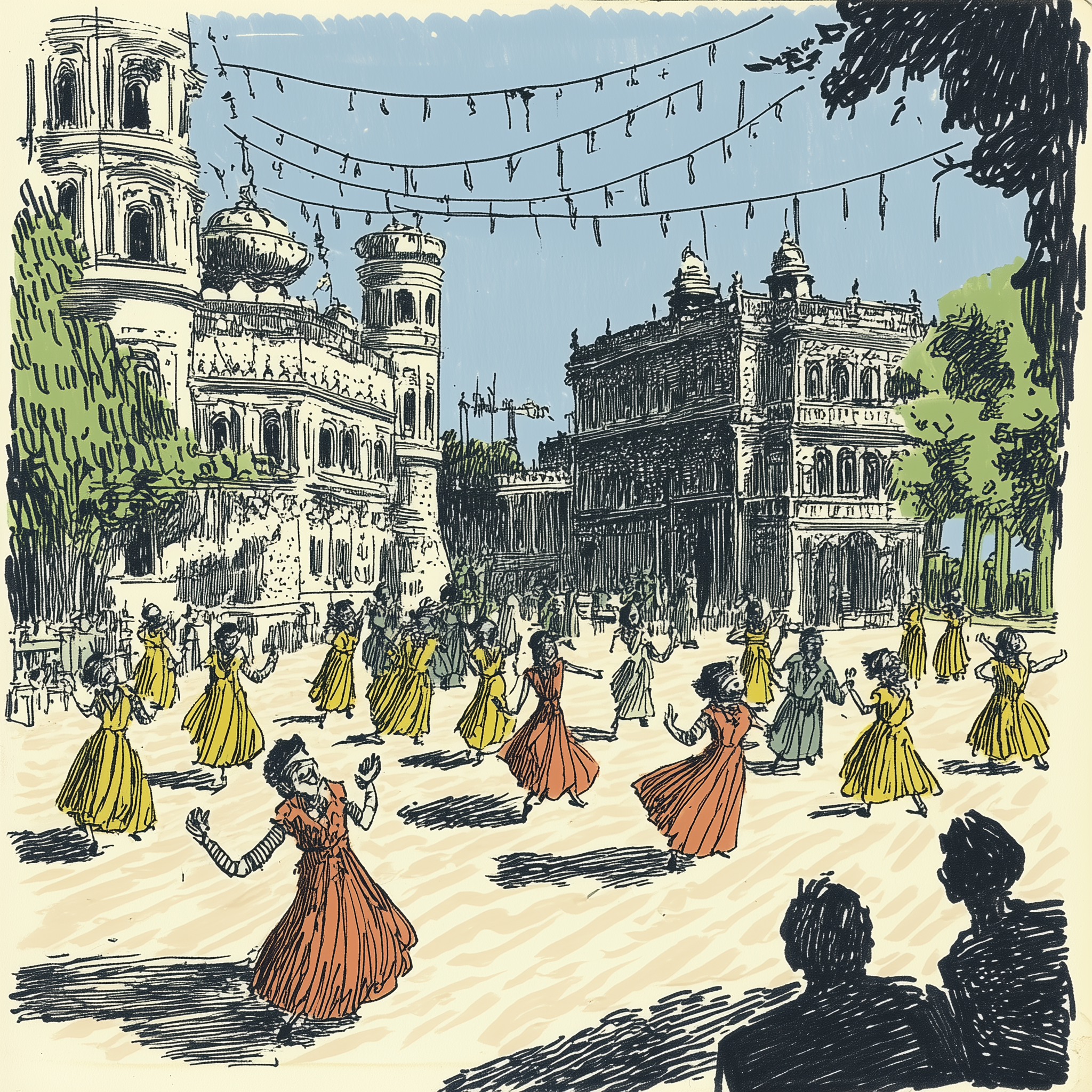
Passepartout, however, had no sooner heard his master's orders on leaving the “Mongolia” than he saw at once that they were to leave Bombay as they had done Suez and Paris, and that the journey would be extended at least as far as Calcutta, and perhaps beyond that place. He began to ask himself if this bet that Mr. Fogg talked about was not really in good earnest, and whether his fate was not in truth forcing him, despite his love of repose, around the world in eighty days!
Having purchased the usual quota of shirts and shoes, he took a leisurely promenade about the streets, where crowds of people of many nationalities—Europeans, Persians with pointed caps, Banyas with round turbans, Sindes with square bonnets, Parsees with black mitres, and long-robed Armenians—were collected. It happened to be the day of a Parsee festival. These descendants of the sect of Zoroaster—the most thrifty, civilised, intelligent, and austere of the East Indians, among whom are counted the richest native merchants of Bombay—were celebrating a sort of religious carnival, with processions and shows, in the midst of which Indian dancing-girls, clothed in rose-coloured gauze, looped up with gold and silver, danced airily, but with perfect modesty, to the sound of viols and the clanging of tambourines. It is needless to say that Passepartout watched these curious ceremonies with staring eyes and gaping mouth, and that his countenance was that of the greenest booby imaginable.
8 | Passepartout's Misadventure at the Pagoda
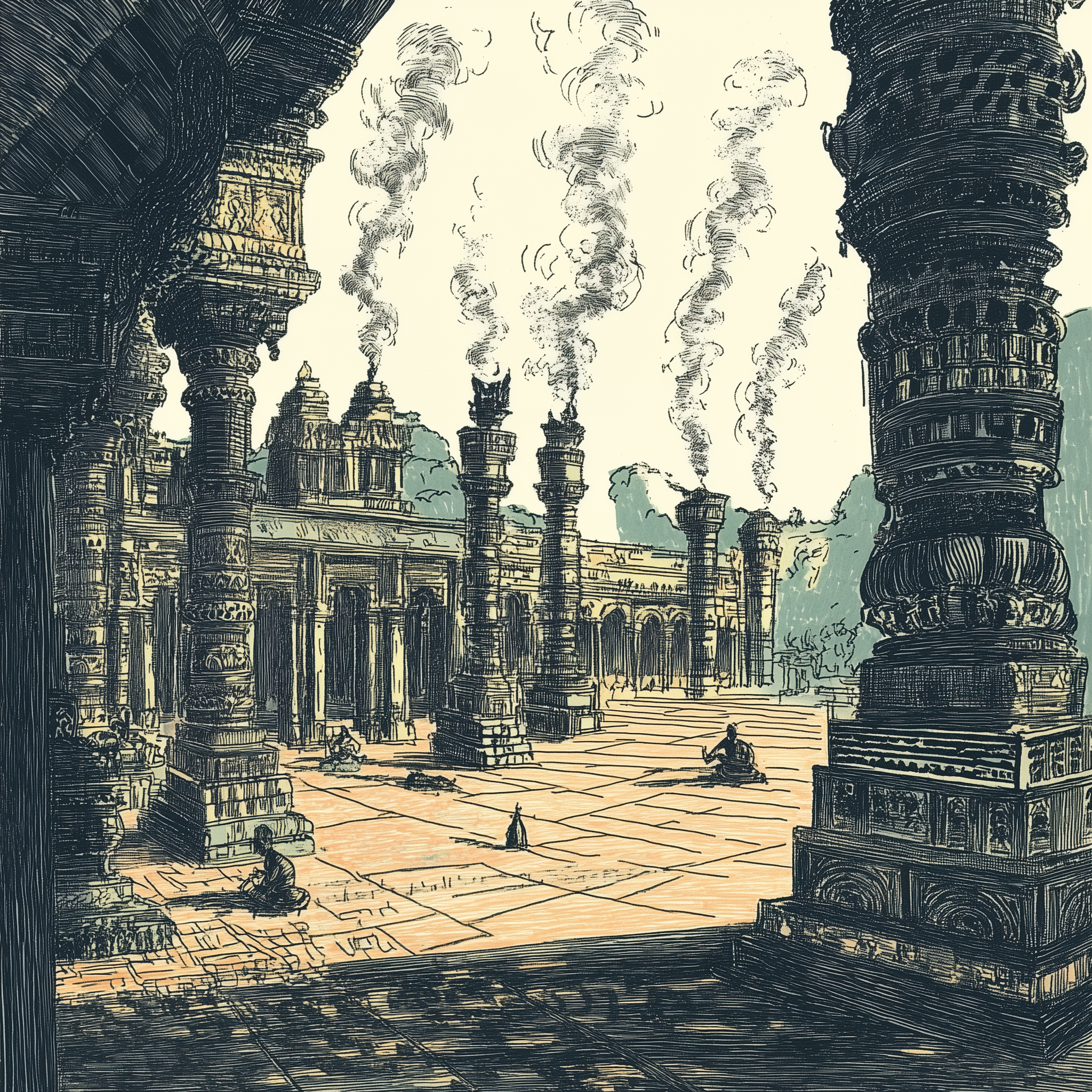
Unhappily for his master, as well as himself, his curiosity drew him unconsciously farther off than he intended to go. At last, having seen the Parsee carnival wind away in the distance, he was turning his steps towards the station, when he happened to espy the splendid pagoda on Malabar Hill, and was seized with an irresistible desire to see its interior. He was quite ignorant that it is forbidden to Christians to enter certain Indian temples, and that even the faithful must not go in without first leaving their shoes outside the door. It may be said here that the wise policy of the British Government severely punishes a disregard of the practices of the native religions.
Passepartout, however, thinking no harm, went in like a simple tourist, and was soon lost in admiration of the splendid Brahmin ornamentation which everywhere met his eyes, when of a sudden he found himself sprawling on the sacred flagging. He looked up to behold three enraged priests, who forthwith fell upon him; tore off his shoes, and began to beat him with loud, savage exclamations. The agile Frenchman was soon upon his feet again, and lost no time in knocking down two of his long-gowned adversaries with his fists and a vigorous application of his toes; then, rushing out of the pagoda as fast as his legs could carry him, he soon escaped the third priest by mingling with the crowd in the streets.
9 | Departure from Bombay
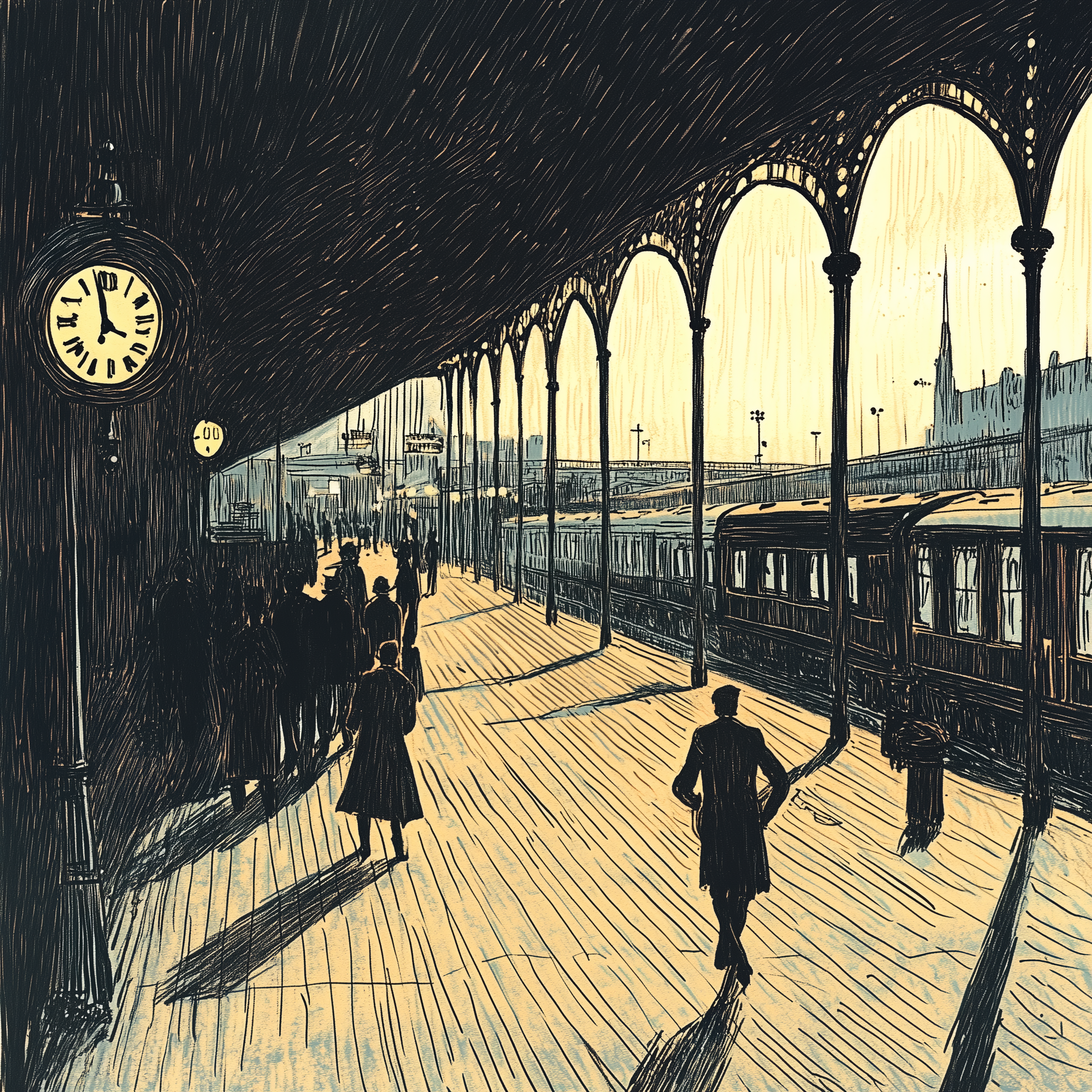
At five minutes before eight, Passepartout, hatless, shoeless, and having in the squabble lost his package of shirts and shoes, rushed breathlessly into the station.
Fix, who had followed Mr. Fogg to the station, and saw that he was really going to leave Bombay, was there, upon the platform. He had resolved to follow the supposed robber to Calcutta, and farther, if necessary. Passepartout did not observe the detective, who stood in an obscure corner; but Fix heard him relate his adventures in a few words to Mr. Fogg.
“*I hope that this will not happen again,*” said Phileas Fogg coldly, as he got into the train. Poor Passepartout, quite crestfallen, followed his master without a word. Fix was on the point of entering another carriage, when an idea struck him which induced him to alter his plan.
“*No, I'll stay,*” muttered he. “*An offence has been committed on Indian soil. I've got my man.*”
Just then the locomotive gave a sharp screech, and the train passed out into the darkness of the night.
10 | Introduction and Train Passengers
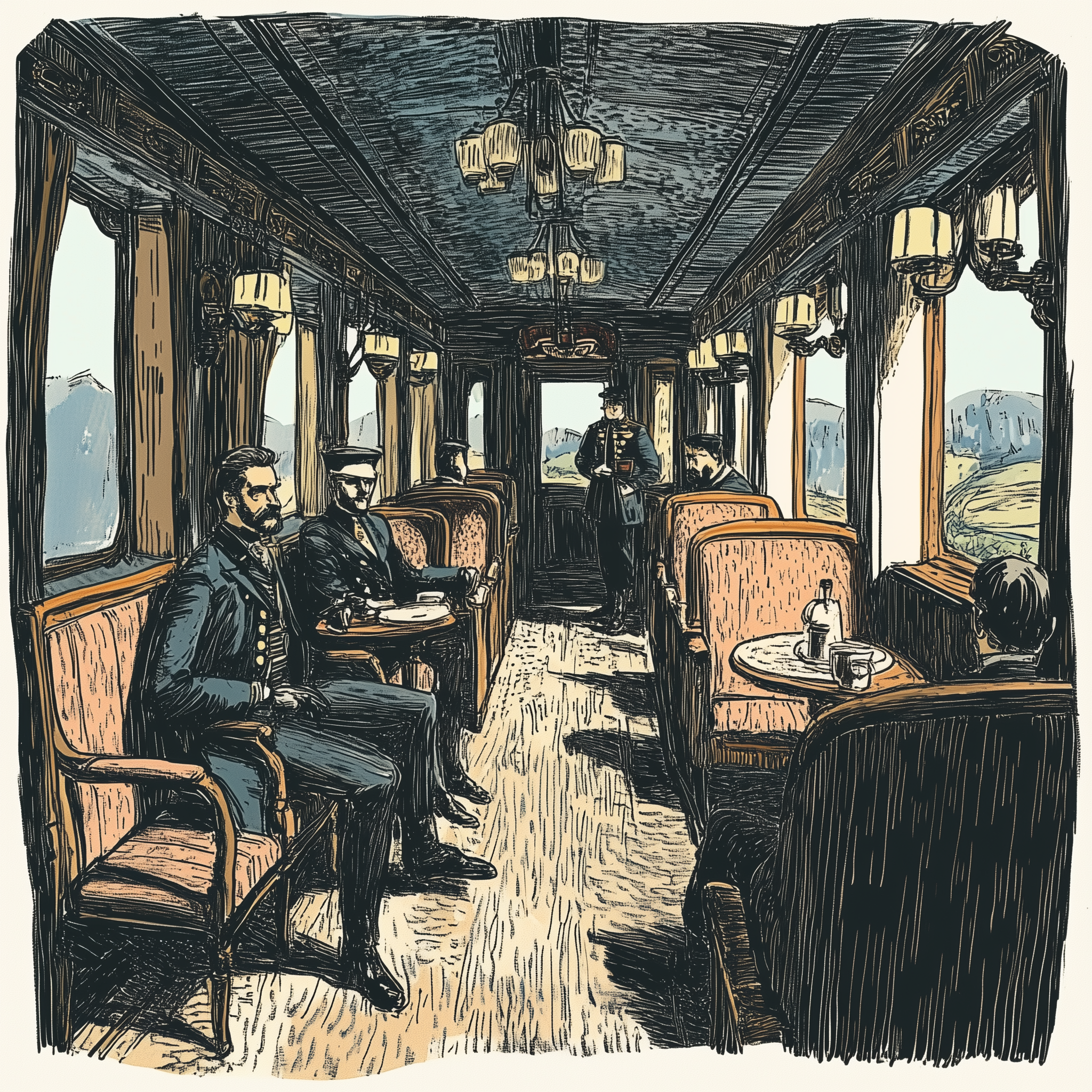
The train had started punctually. Among the passengers were a number of officers, Government officials, and opium and indigo merchants, whose business called them to the eastern coast. Passepartout rode in the same carriage with his master, and a third passenger occupied a seat opposite to them. This was Sir Francis Cromarty, one of Mr. Fogg's whist partners on the “Mongolia,” now on his way to join his corps at Benares.
11 | Sir Francis Cromarty and His Observations of Fogg
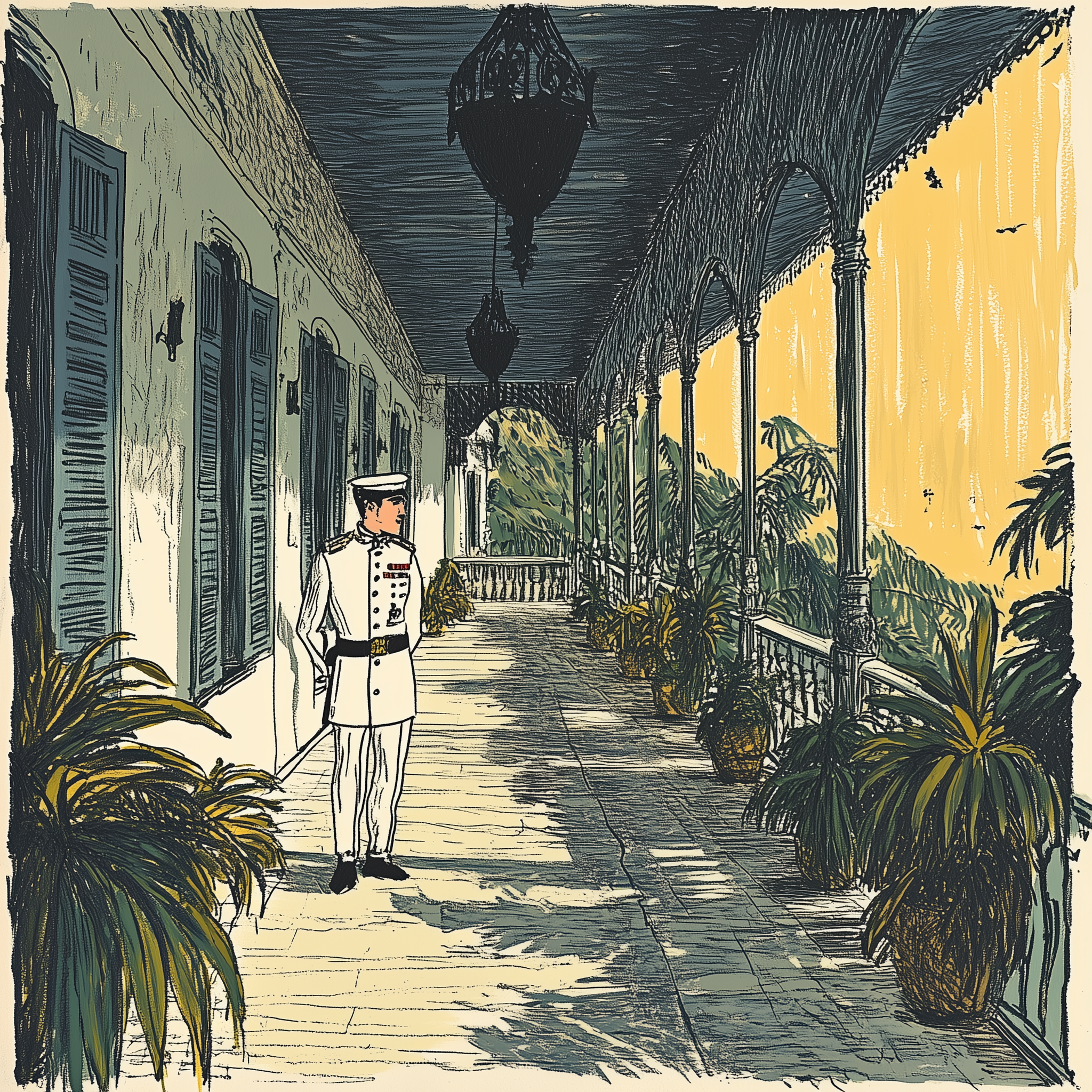
Sir Francis was a tall, fair man of fifty, who had greatly distinguished himself in the last Sepoy revolt. He made India his home, only paying brief visits to England at rare intervals; and was almost as familiar as a native with the customs, history, and character of India and its people. But Phileas Fogg, who was not travelling, but only describing a circumference, took no pains to inquire into these subjects; he was a solid body, traversing an orbit around the terrestrial globe, according to the laws of rational mechanics. He was at this moment calculating in his mind the number of hours spent since his departure from London, and, had it been in his nature to make a useless demonstration, would have rubbed his hands for satisfaction. Sir Francis Cromarty had observed the oddity of his travelling companion—although the only opportunity he had for studying him had been while he was dealing the cards, and between two rubbers—and questioned himself whether a human heart really beat beneath this cold exterior, and whether Phileas Fogg had any sense of the beauties of nature. The brigadier-general was free to mentally confess that, of all the eccentric persons he had ever met, none was comparable to this product of the exact sciences.
12 | Discussion of Fogg's Journey and Travel Through Mountains
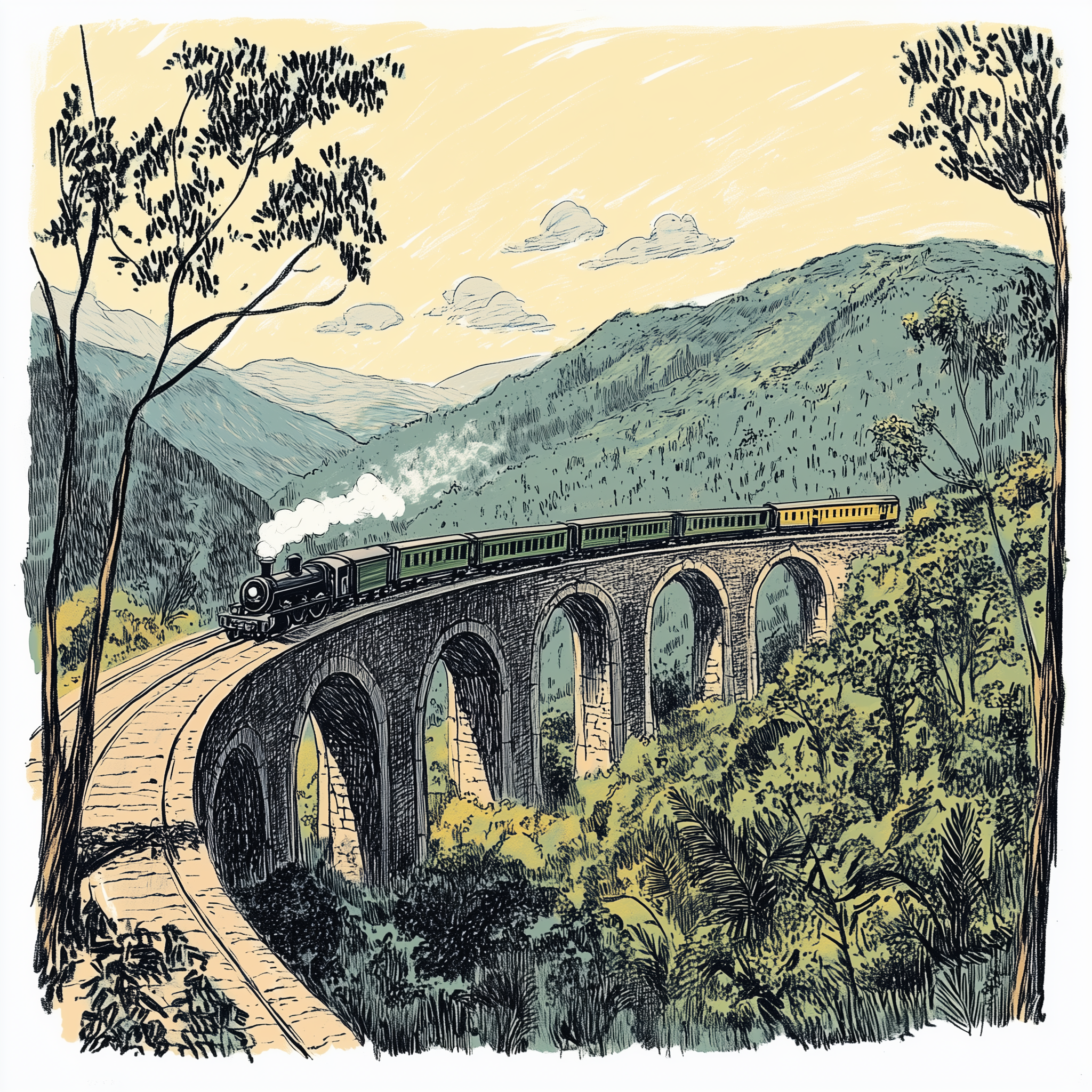
Phileas Fogg had not concealed from Sir Francis his design of going round the world, nor the circumstances under which he set out; and the general only saw in the wager a useless eccentricity and a lack of sound common sense. In the way this strange gentleman was going on, he would leave the world without having done any good to himself or anybody else.
An hour after leaving Bombay the train had passed the viaducts and the Island of Salcette, and had got into the open country. At Callyan they reached the junction of the branch line which descends towards south-eastern India by Kandallah and Pounah; and, passing Pauwell, they entered the defiles of the mountains, with their basalt bases, and their summits crowned with thick and verdant forests.
13 | The Conversation About Delays
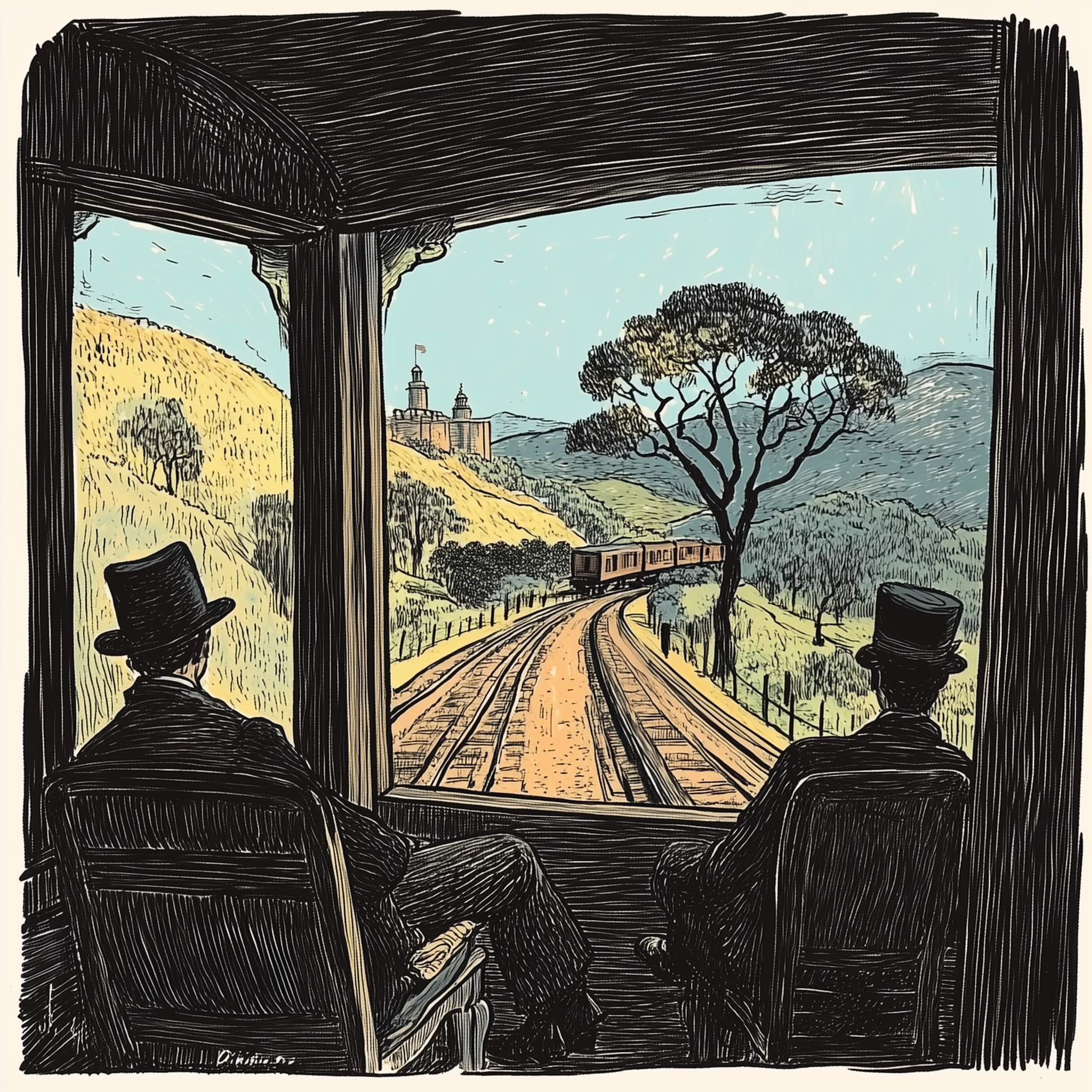
Phileas Fogg and Sir Francis Cromarty exchanged a few words from time to time, and now Sir Francis, reviving the conversation, observed, “Some years ago, Mr. Fogg, you would have met with a delay at this point which would probably have lost you your wager.”
“*How so, Sir Francis?*”
“*Because the railway stopped at the base of these mountains, which the passengers were obliged to cross in palanquins or on ponies to Kandallah, on the other side.*”
“*Such a delay would not have deranged my plans in the least,*” said Mr. Fogg. “*I have constantly foreseen the likelihood of certain obstacles.*”
“*But, Mr. Fogg,*” pursued Sir Francis, “*you run the risk of having some difficulty about this worthy fellow's adventure at the pagoda.*” Passepartout, his feet comfortably wrapped in his travelling-blanket, was sound asleep and did not dream that anybody was talking about him. “*The Government is very severe upon that kind of offence. It takes particular care that the religious customs of the Indians should be respected, and if your servant were caught—*”
“*Very well, Sir Francis,*” replied Mr. Fogg; “*if he had been caught he would have been condemned and punished, and then would have quietly returned to Europe. I don't see how this affair could have delayed his master.*”
14 | Journey Through India's Landscape
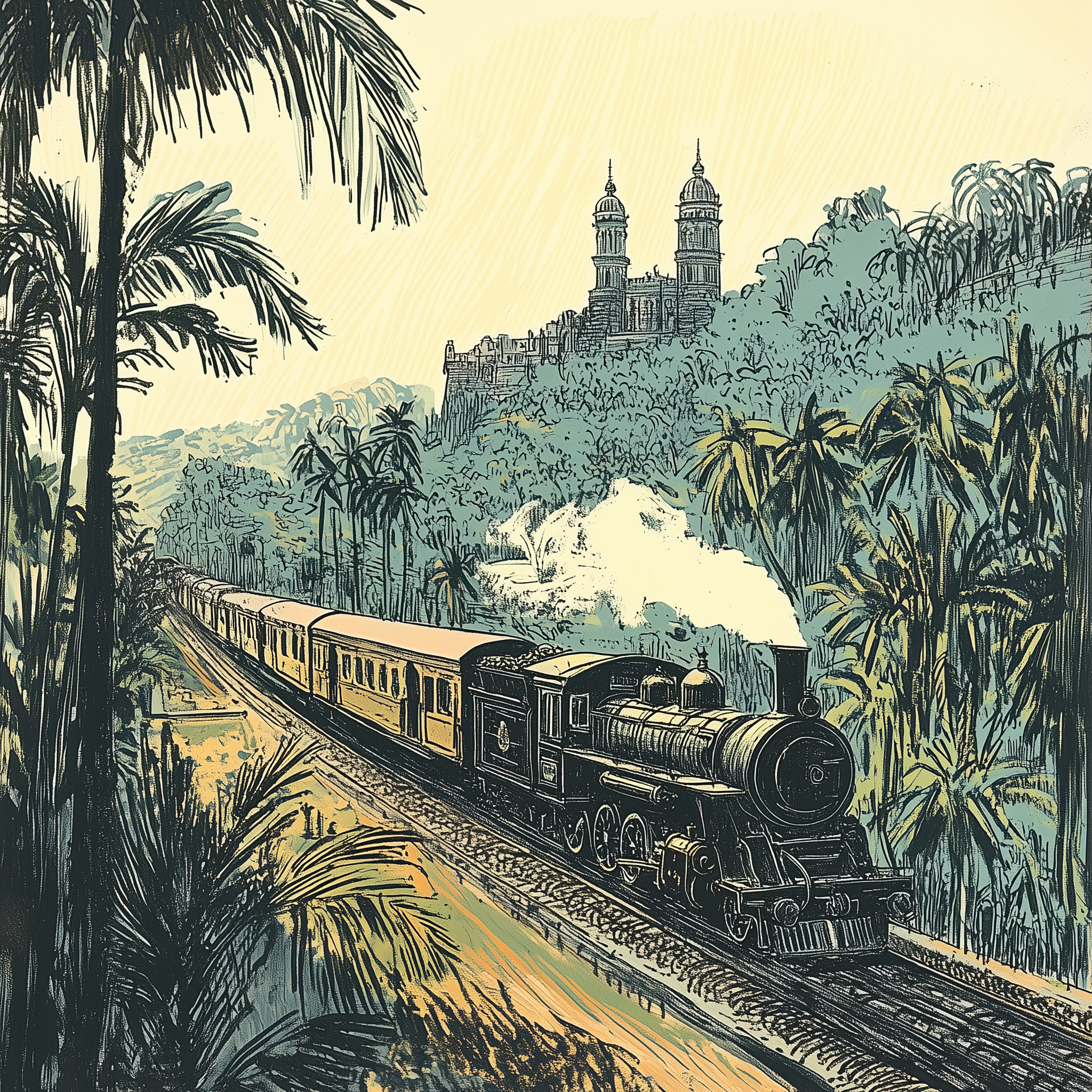
The conversation fell again. During the night the train left the mountains behind, and passed Nassik, and the next day proceeded over the flat, well-cultivated country of the Khandeish, with its straggling villages, above which rose the minarets of the pagodas. This fertile territory is watered by numerous small rivers and limpid streams, mostly tributaries of the Godavery.
Passepartout, on waking and looking out, could not realise that he was actually crossing India in a railway train. The locomotive, guided by an English engineer and fed with English coal, threw out its smoke upon cotton, coffee, nutmeg, clove, and pepper plantations, while the steam curled in spirals around groups of palm-trees, in the midst of which were seen picturesque bungalows, viharis (sort of abandoned monasteries), and marvellous temples enriched by the exhaustless ornamentation of Indian architecture. Then they came upon vast tracts extending to the horizon, with jungles inhabited by snakes and tigers, which fled at the noise of the train; succeeded by forests penetrated by the railway, and still haunted by elephants which, with pensive eyes, gazed at the train as it passed. The travellers crossed, beyond Milligaum, the fatal country so often stained with blood by the sectaries of the goddess Kali. Not far off rose Ellora, with its graceful pagodas, and the famous Aurungabad, capital of the ferocious Aureng-Zeb, now the chief town of one of the detached provinces of the kingdom of the Nizam. It was thereabouts that Feringhea, the Thuggee chief, king of the stranglers, held his sway. These ruffians, united by a secret bond, strangled victims of every age in honour of the goddess Death, without ever shedding blood; there was a period when this part of the country could scarcely be travelled over without corpses being found in every direction. The English Government has succeeded in greatly diminishing these murders, though the Thuggees still exist, and pursue the exercise of their horrible rites.
At half-past twelve the train stopped at Burhampoor where Passepartout was able to purchase some Indian slippers, ornamented with false pearls, in which, with evident vanity, he proceeded to encase his feet. The travellers made a hasty breakfast and started off for Assurghur, after skirting for a little the banks of the small river Tapty, which empties into the Gulf of Cambray, near Surat.
15 | Passepartout's Reflections and the Time Discussion
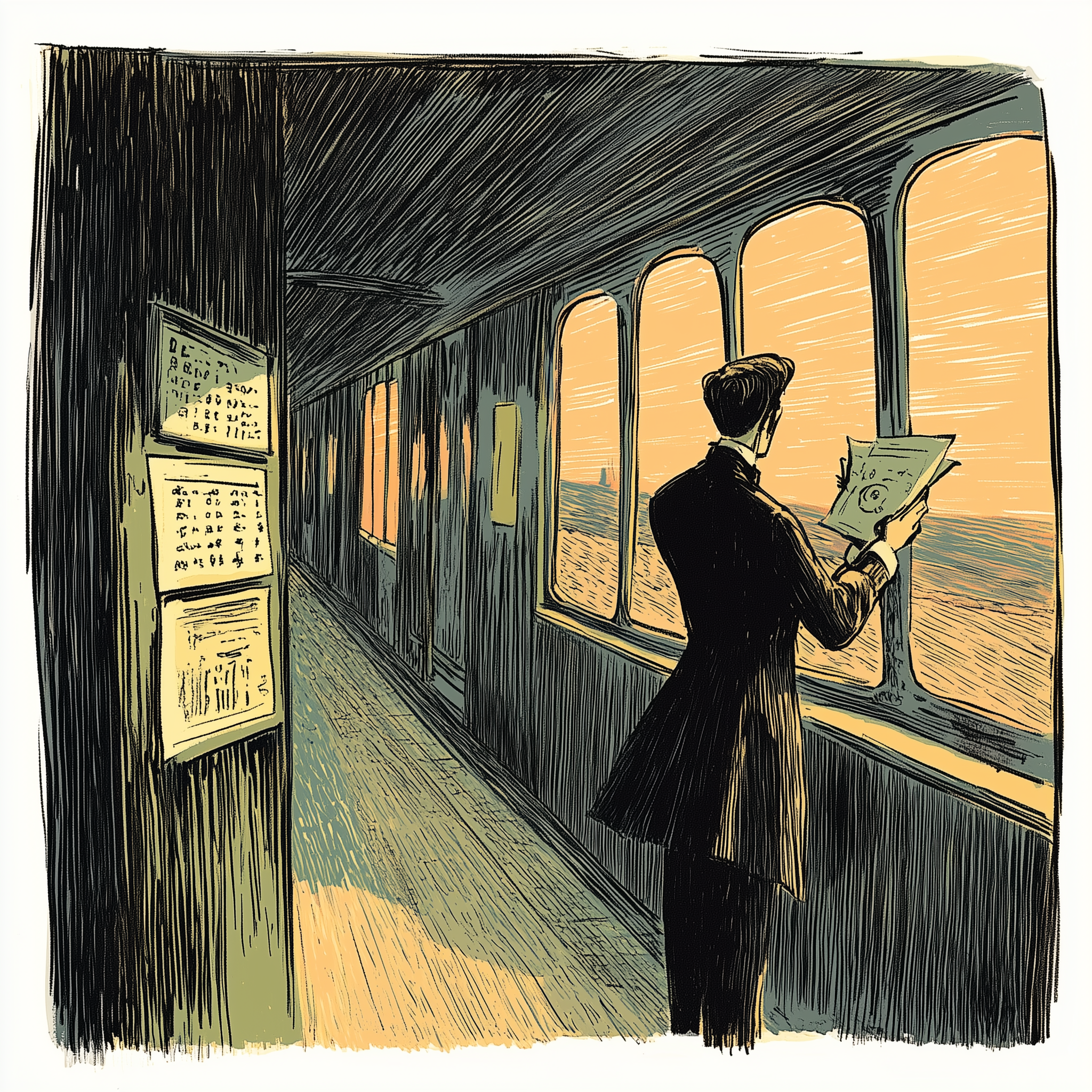
Passepartout was now plunged into absorbing reverie. Up to his arrival at Bombay, he had entertained hopes that their journey would end there; but, now that they were plainly whirling across India at full speed, a sudden change had come over the spirit of his dreams. His old vagabond nature returned to him; the fantastic ideas of his youth once more took possession of him. He came to regard his master's project as intended in good earnest, believed in the reality of the bet, and therefore in the tour of the world and the necessity of making it without fail within the designated period. Already he began to worry about possible delays, and accidents which might happen on the way. He recognised himself as being personally interested in the wager, and trembled at the thought that he might have been the means of losing it by his unpardonable folly of the night before. Being much less cool-headed than Mr. Fogg, he was much more restless, counting and recounting the days passed over, uttering maledictions when the train stopped, and accusing it of sluggishness, and mentally blaming Mr. Fogg for not having bribed the engineer. The worthy fellow was ignorant that, while it was possible by such means to hasten the rate of a steamer, it could not be done on the railway.
The train entered the defiles of the Sutpour Mountains, which separate the Khandeish from Bundelcund, towards evening. The next day Sir Francis Cromarty asked Passepartout what time it was; to which, on consulting his watch, he replied that it was three in the morning. This famous timepiece, always regulated on the Greenwich meridian, which was now some seventy-seven degrees westward, was at least four hours slow. Sir Francis corrected Passepartout's time, whereupon the latter made the same remark that he had done to Fix; and upon the general insisting that the watch should be regulated in each new meridian, since he was constantly going eastward, that is in the face of the sun, and therefore the days were shorter by four minutes for each degree gone over, Passepartout obstinately refused to alter his watch, which he kept at London time. It was an innocent delusion which could harm no one.
16 | The Railway's Unexpected End
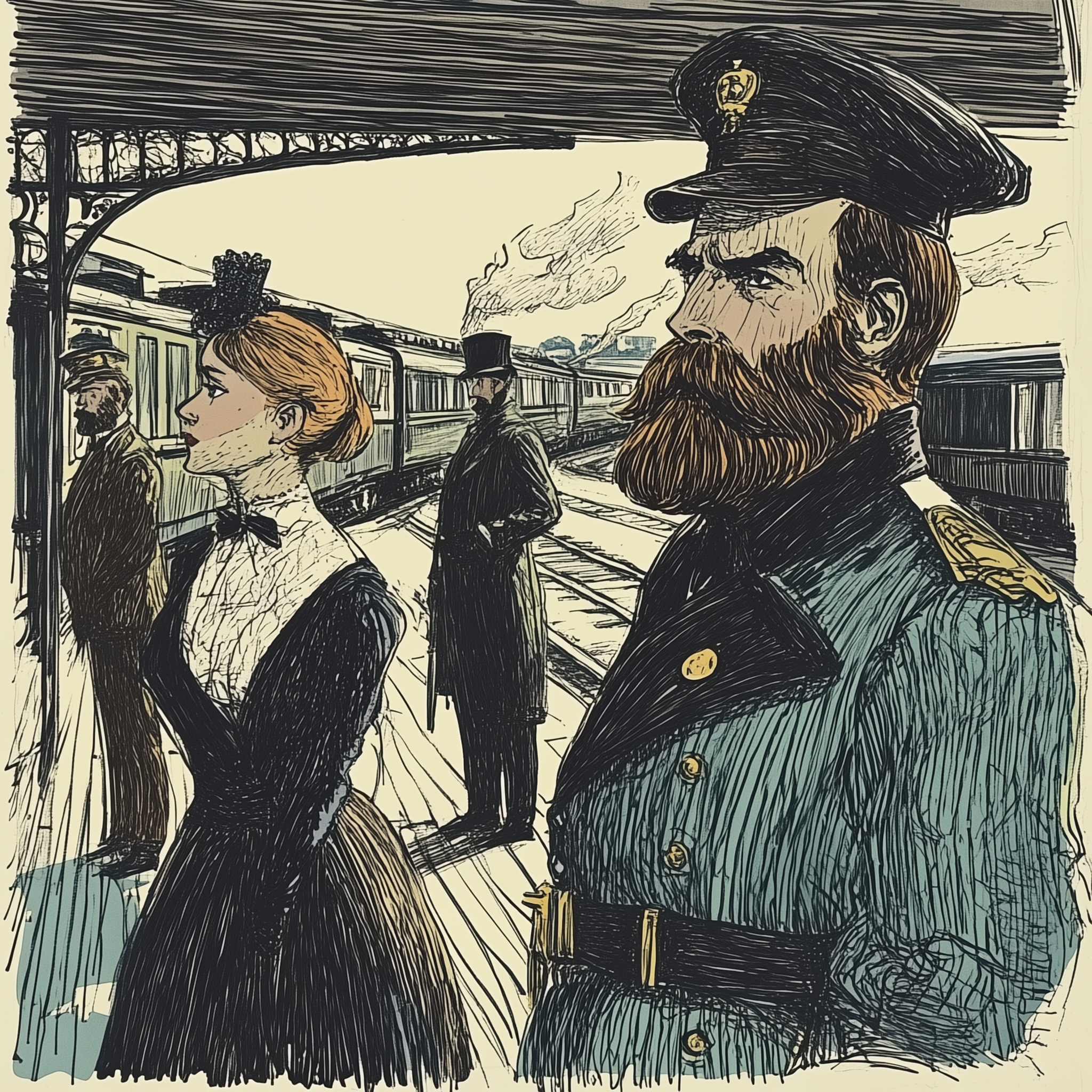
The train stopped, at eight o'clock, in the midst of a glade some fifteen miles beyond Rothal, where there were several bungalows, and workmen's cabins. The conductor, passing along the carriages, shouted, “Passengers will get out here!”
Phileas Fogg looked at Sir Francis Cromarty for an explanation; but the general could not tell what meant a halt in the midst of this forest of dates and acacias.
Passepartout, not less surprised, rushed out and speedily returned, crying: “*Monsieur, no more railway!*”
“*What do you mean?*” asked Sir Francis.
“*I mean to say that the train isn't going on.*”
The general at once stepped out, while Phileas Fogg calmly followed him, and they proceeded together to the conductor.
“*Where are we?*” asked Sir Francis.
“*At the hamlet of Kholby.*”
“*Do we stop here?*”
“*Certainly. The railway isn't finished.*”
“*What! not finished?*”
“*No. There's still a matter of fifty miles to be laid from here to Allahabad, where the line begins again.*”
“*But the papers announced the opening of the railway throughout.*”
“*What would you have, officer? The papers were mistaken.*”
“*Yet you sell tickets from Bombay to Calcutta,*” retorted Sir Francis, who was growing warm.
“*No doubt,*” replied the conductor; “*but the passengers know that they must provide means of transportation for themselves from Kholby to Allahabad.*”
Sir Francis was furious. Passepartout would willingly have knocked the conductor down, and did not dare to look at his master.
“*Sir Francis,*” said Mr. Fogg quietly, “*we will, if you please, look about for some means of conveyance to Allahabad.*”
“*Mr. Fogg, this is a delay greatly to your disadvantage.*”
“*No, Sir Francis; it was foreseen.*”
“*What! You knew that the way—*”
“*Not at all; but I knew that some obstacle or other would sooner or later arise on my route. Nothing, therefore, is lost. I have two days, which I have already gained, to sacrifice. A steamer leaves Calcutta for Hong Kong at noon, on the 25th. This is the 22nd, and we shall reach Calcutta in time.*”
There was nothing to say to so confident a response.
It was but too true that the railway came to a termination at this point. The papers were like some watches, which have a way of getting too fast, and had been premature in their announcement of the completion of the line. The greater part of the travellers were aware of this interruption, and, leaving the train, they began to engage such vehicles as the village could provide four-wheeled palkigharis, waggons drawn by zebus, carriages that looked like perambulating pagodas, palanquins, ponies, and what not.
17 | Search for Alternative Transportation
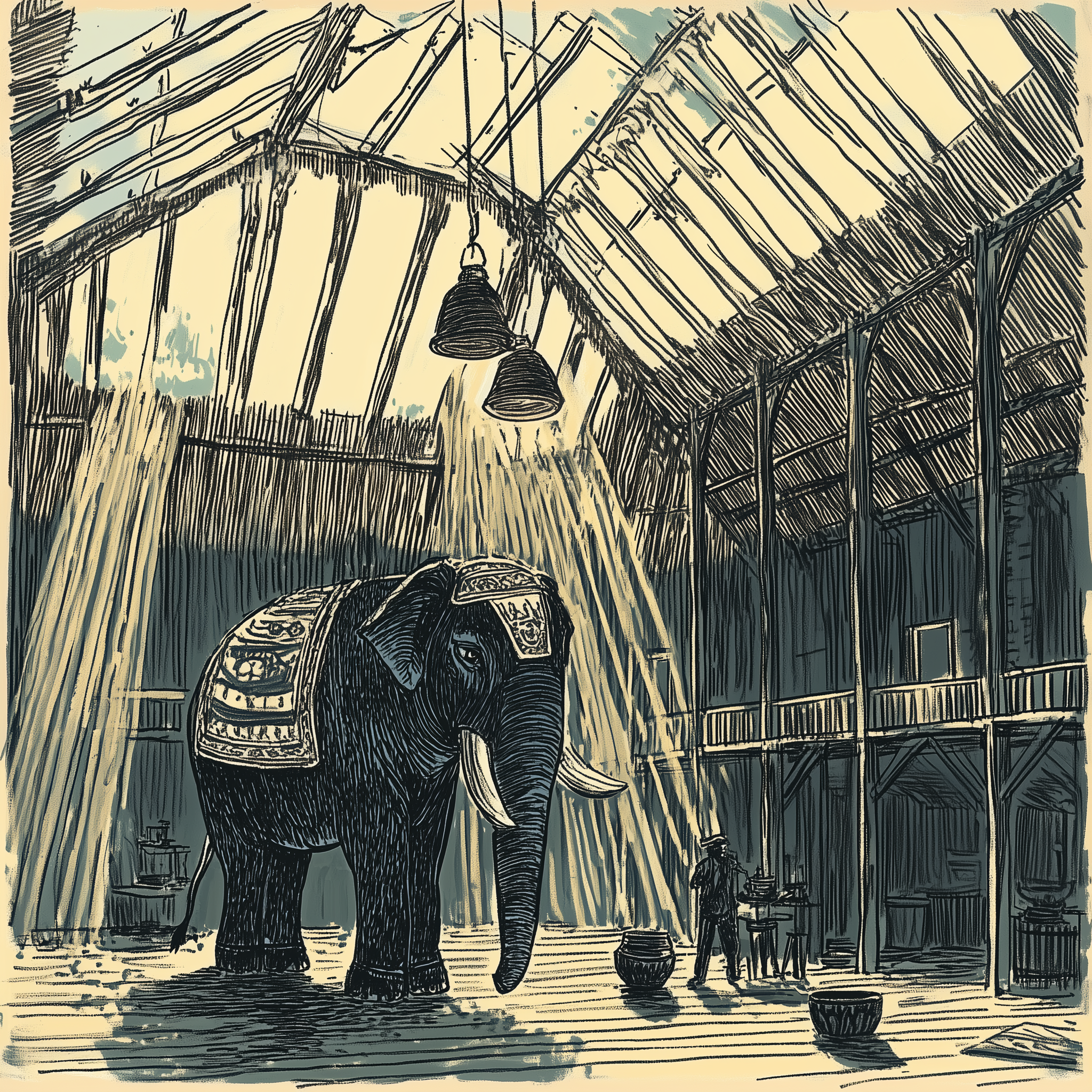
Mr. Fogg and Sir Francis Cromarty, after searching the village from end to end, came back without having found anything.
“*I shall go afoot,*” said Phileas Fogg.
Passepartout, who had now rejoined his master, made a wry grimace, as he thought of his magnificent, but too frail Indian shoes. Happily he too had been looking about him, and, after a moment's hesitation, said, “*Monsieur, I think I have found a means of conveyance.*”
“*What?*”
“*An elephant! An elephant that belongs to an Indian who lives but a hundred steps from here.*”
“*Let's go and see the elephant,*” replied Mr. Fogg.
18 | The Elephant Negotiation
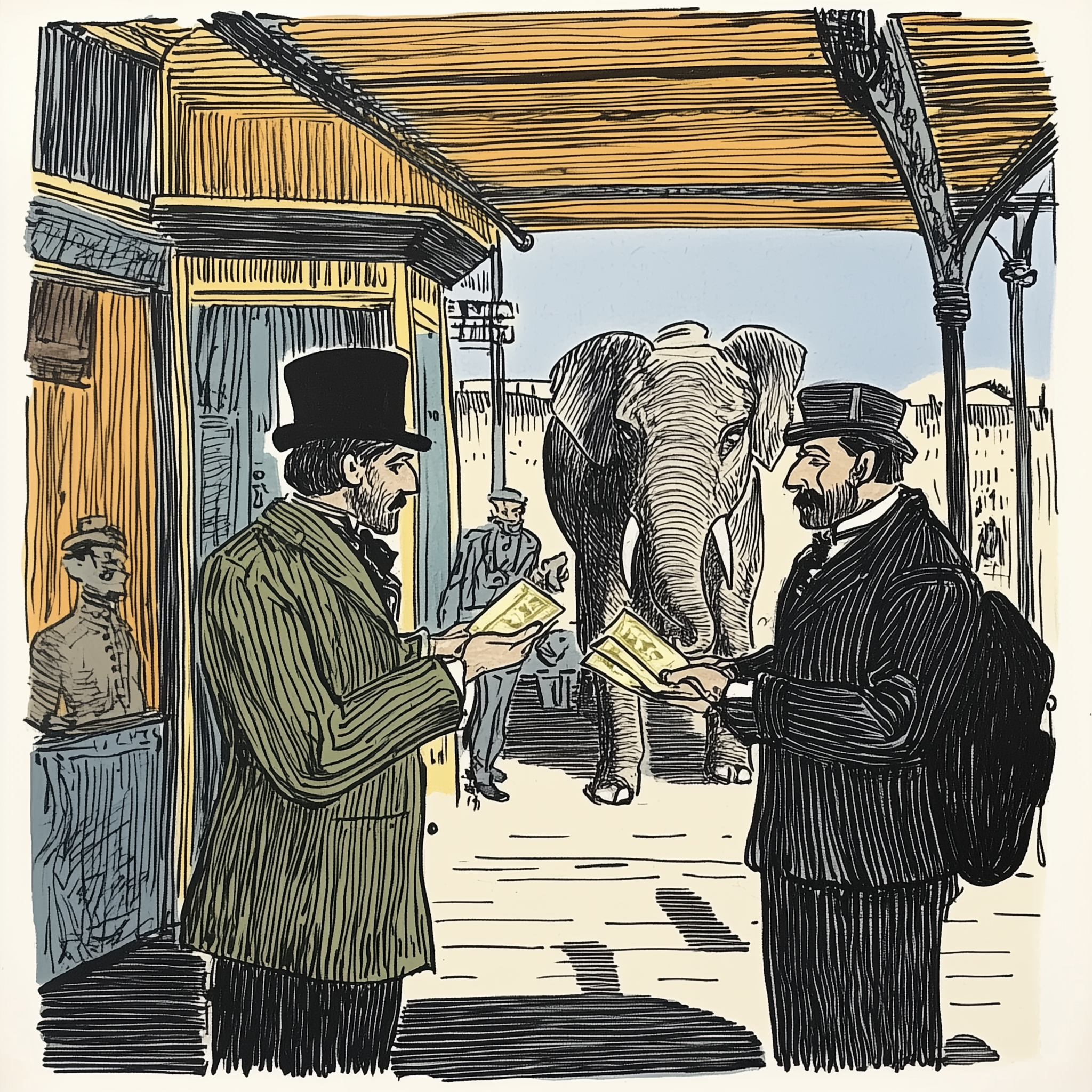
They soon reached a small hut, near which, enclosed within some high palings, was the animal in question. An Indian came out of the hut, and, at their request, conducted them within the enclosure. The elephant, which its owner had reared, not for a beast of burden, but for warlike purposes, was half domesticated. The Indian had begun already, by often irritating him, and feeding him every three months on sugar and butter, to impart to him a ferocity not in his nature, this method being often employed by those who train the Indian elephants for battle. Happily, however, for Mr. Fogg, the animal's instruction in this direction had not gone far, and the elephant still preserved his natural gentleness. Kiouni—this was the name of the beast—could doubtless travel rapidly for a long time, and, in default of any other means of conveyance, Mr. Fogg resolved to hire him. But elephants are far from cheap in India, where they are becoming scarce, the males, which alone are suitable for circus shows, are much sought, especially as but few of them are domesticated. When therefore Mr. Fogg proposed to the Indian to hire Kiouni, he refused point-blank. Mr. Fogg persisted, offering the excessive sum of ten pounds an hour for the loan of the beast to Allahabad. Refused. Twenty pounds? Refused also. Forty pounds? Still refused. Passepartout jumped at each advance; but the Indian declined to be tempted. Yet the offer was an alluring one, for, supposing it took the elephant fifteen hours to reach Allahabad, his owner would receive no less than six hundred pounds sterling.
Phileas Fogg, without getting in the least flurried, then proposed to purchase the animal outright, and at first offered a thousand pounds for him. The Indian, perhaps thinking he was going to make a great bargain, still refused.
Sir Francis Cromarty took Mr. Fogg aside, and begged him to reflect before he went any further; to which that gentleman replied that he was not in the habit of acting rashly, that a bet of twenty thousand pounds was at stake, that the elephant was absolutely necessary to him, and that he would secure him if he had to pay twenty times his value. Returning to the Indian, whose small, sharp eyes, glistening with avarice, betrayed that with him it was only a question of how great a price he could obtain. Mr. Fogg offered first twelve hundred, then fifteen hundred, eighteen hundred, two thousand pounds. Passepartout, usually so rubicund, was fairly white with suspense.
At two thousand pounds the Indian yielded.
“*What a price, good heavens!*” cried Passepartout, “*for an elephant.*”
19 | Preparations and Departure
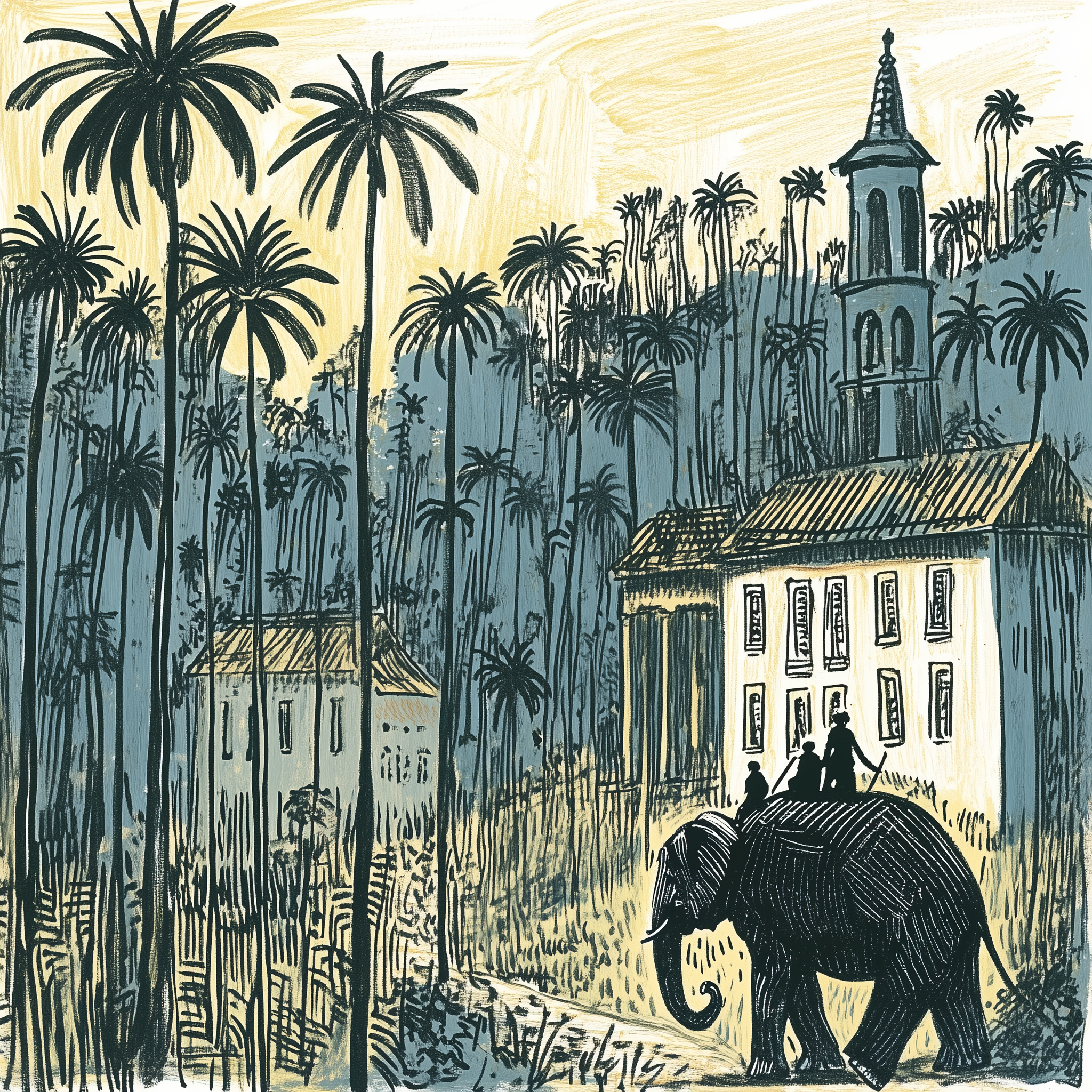
It only remained now to find a guide, which was comparatively easy. A young Parsee, with an intelligent face, offered his services, which Mr. Fogg accepted, promising so generous a reward as to materially stimulate his zeal. The elephant was led out and equipped. The Parsee, who was an accomplished elephant driver, covered his back with a sort of saddle-cloth, and attached to each of his flanks some curiously uncomfortable howdahs. Phileas Fogg paid the Indian with some banknotes which he extracted from the famous carpet-bag, a proceeding that seemed to deprive poor Passepartout of his vitals. Then he offered to carry Sir Francis to Allahabad, which the brigadier gratefully accepted, as one traveller the more would not be likely to fatigue the gigantic beast. Provisions were purchased at Kholby, and, while Sir Francis and Mr. Fogg took the howdahs on either side, Passepartout got astride the saddle-cloth between them. The Parsee perched himself on the elephant's neck, and at nine o'clock they set out from the village, the animal marching off through the dense forest of palms by the shortest cut.
20 | Beginning the Journey Through the Forest
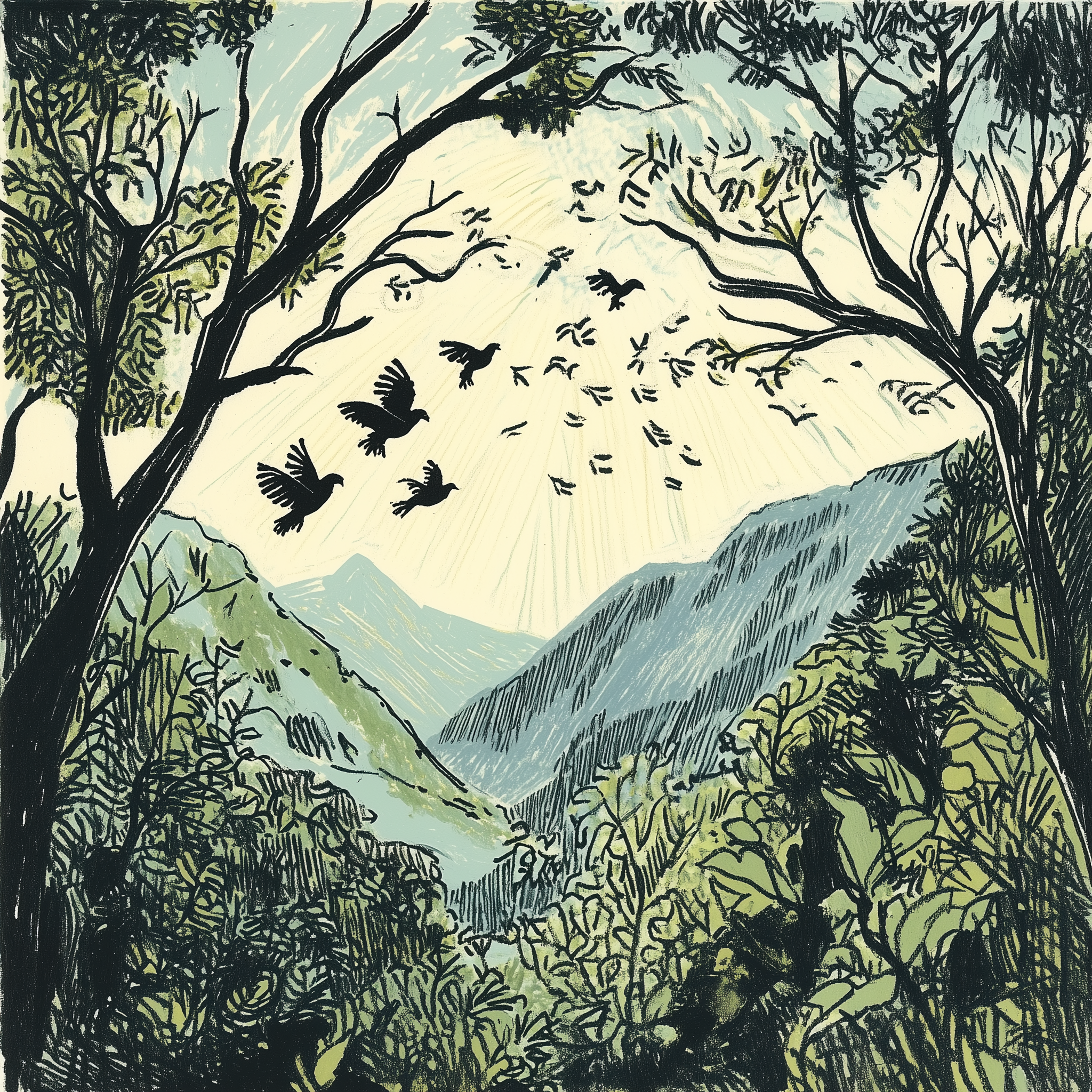
In order to shorten the journey, the guide passed to the left of the line where the railway was still in process of being built. This line, owing to the capricious turnings of the Vindhia Mountains, did not pursue a straight course. The Parsee, who was quite familiar with the roads and paths in the district, declared that they would gain twenty miles by striking directly through the forest.
21 | The Elephant Ride
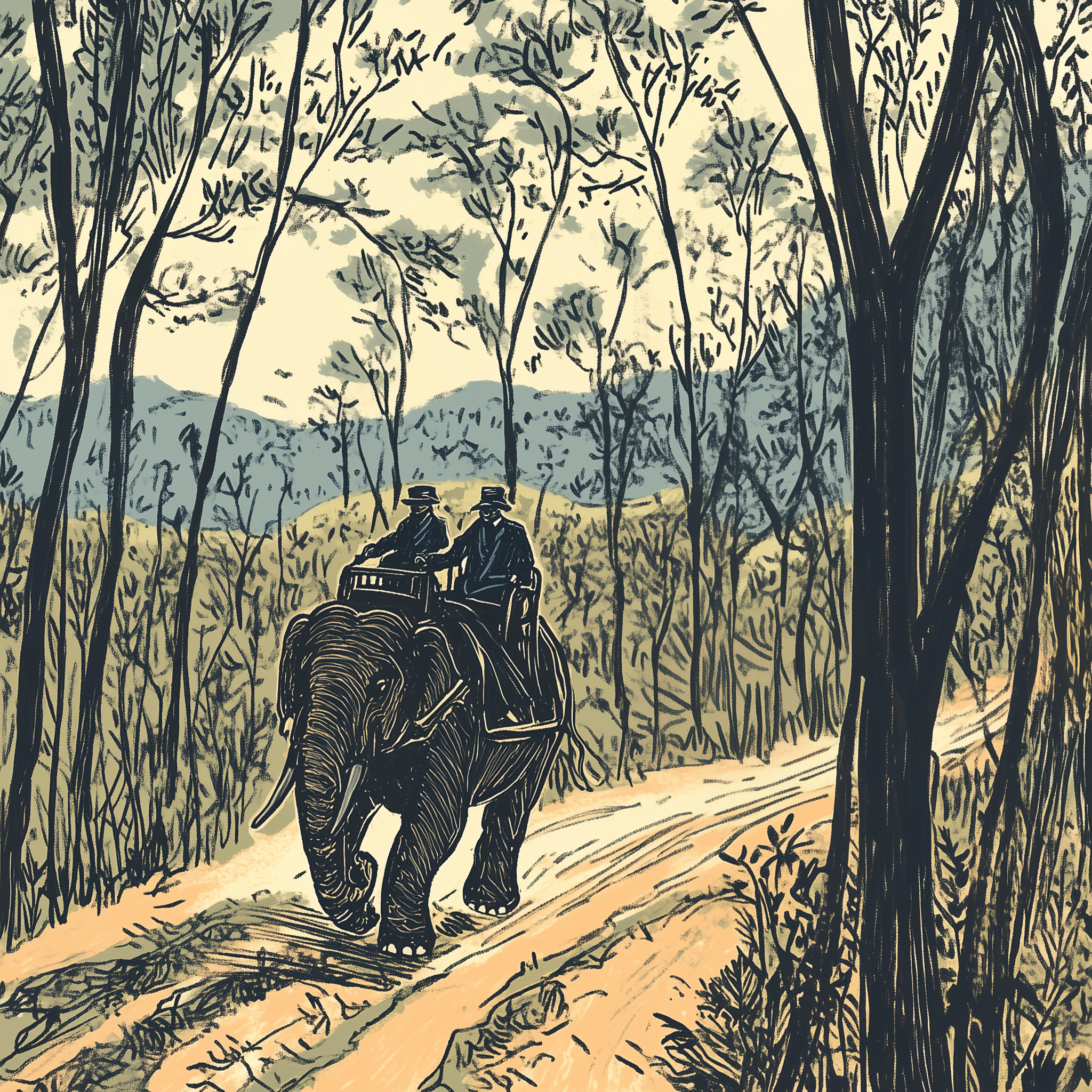
Phileas Fogg and Sir Francis Cromarty, plunged to the neck in the peculiar howdahs provided for them, were horribly jostled by the swift trotting of the elephant, spurred on as he was by the skilful Parsee; but they endured the discomfort with true British phlegm, talking little, and scarcely able to catch a glimpse of each other. As for Passepartout, who was mounted on the beast's back, and received the direct force of each concussion as he trod along, he was very careful, in accordance with his master's advice, to keep his tongue from between his teeth, as it would otherwise have been bitten off short. The worthy fellow bounced from the elephant's neck to his rump, and vaulted like a clown on a spring-board; yet he laughed in the midst of his bouncing, and from time to time took a piece of sugar out of his pocket, and inserted it in Kiouni's trunk, who received it without in the least slackening his regular trot.
22 | First Rest Stop and Continuing Through Bundelcund
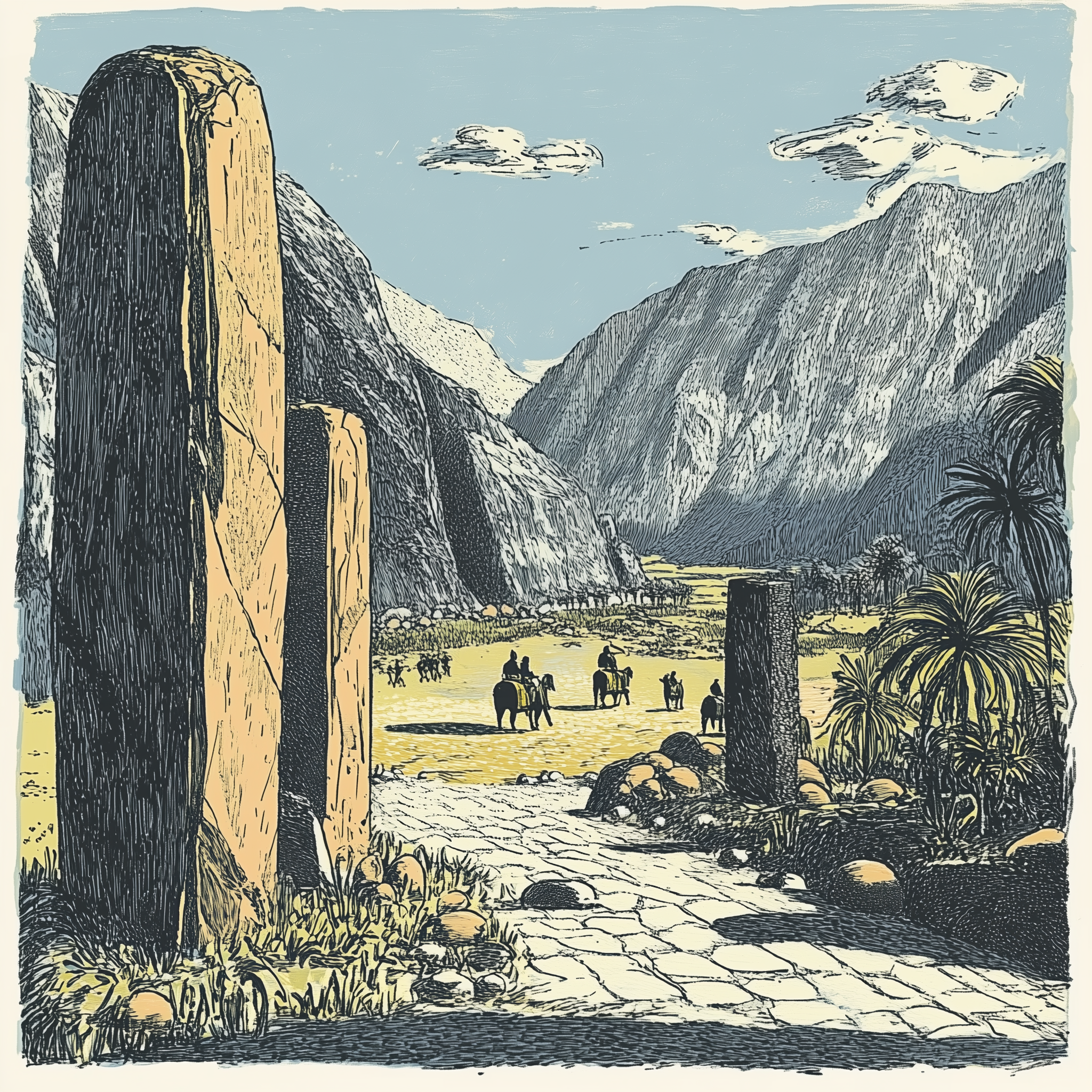
After two hours the guide stopped the elephant, and gave him an hour for rest, during which Kiouni, after quenching his thirst at a neighbouring spring, set to devouring the branches and shrubs round about him. Neither Sir Francis nor Mr. Fogg regretted the delay, and both descended with a feeling of relief. “Why, he's made of iron!” exclaimed the general, gazing admiringly on Kiouni.
“Of forged iron,” replied Passepartout, as he set about preparing a hasty breakfast.
At noon the Parsee gave the signal of departure. The country soon presented a very savage aspect. Copses of dates and dwarf-palms succeeded the dense forests; then vast, dry plains, dotted with scanty shrubs, and sown with great blocks of syenite. All this portion of Bundelcund, which is little frequented by travellers, is inhabited by a fanatical population, hardened in the most horrible practices of the Hindoo faith. The English have not been able to secure complete dominion over this territory, which is subjected to the influence of rajahs, whom it is almost impossible to reach in their inaccessible mountain fastnesses. The travellers several times saw bands of ferocious Indians, who, when they perceived the elephant striding across-country, made angry and threatening motions. The Parsee avoided them as much as possible. Few animals were observed on the route; even the monkeys hurried from their path with contortions and grimaces which convulsed Passepartout with laughter.
23 | Passepartout's Concerns
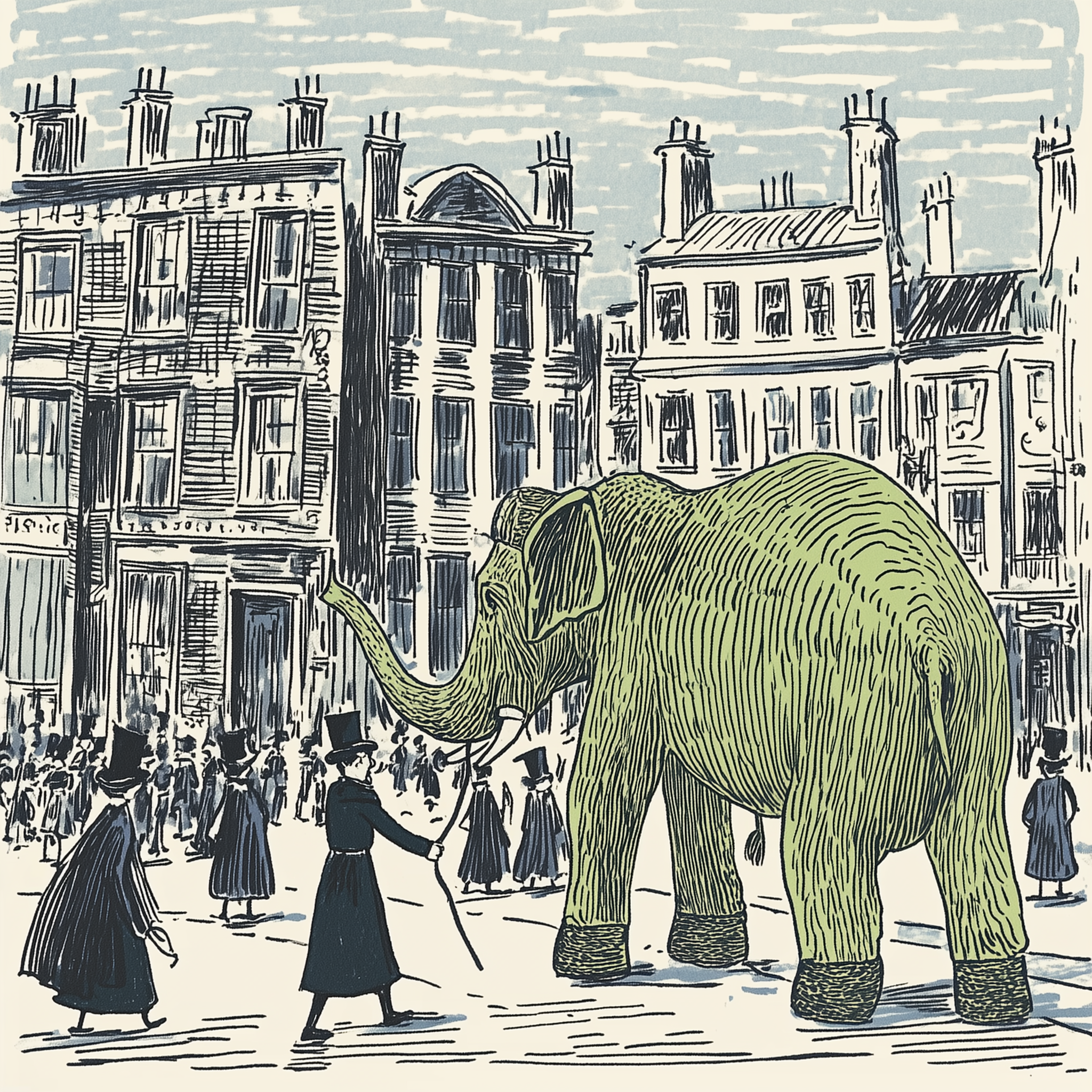
In the midst of his gaiety, however, one thought troubled the worthy servant. What would Mr. Fogg do with the elephant when he got to Allahabad? Would he carry him on with him? Impossible! The cost of transporting him would make him ruinously expensive. Would he sell him, or set him free? The estimable beast certainly deserved some consideration. Should Mr. Fogg choose to make him, Passepartout, a present of Kiouni, he would be very much embarrassed; and these thoughts did not cease worrying him for a long time.
24 | Evening Rest at the Bungalow
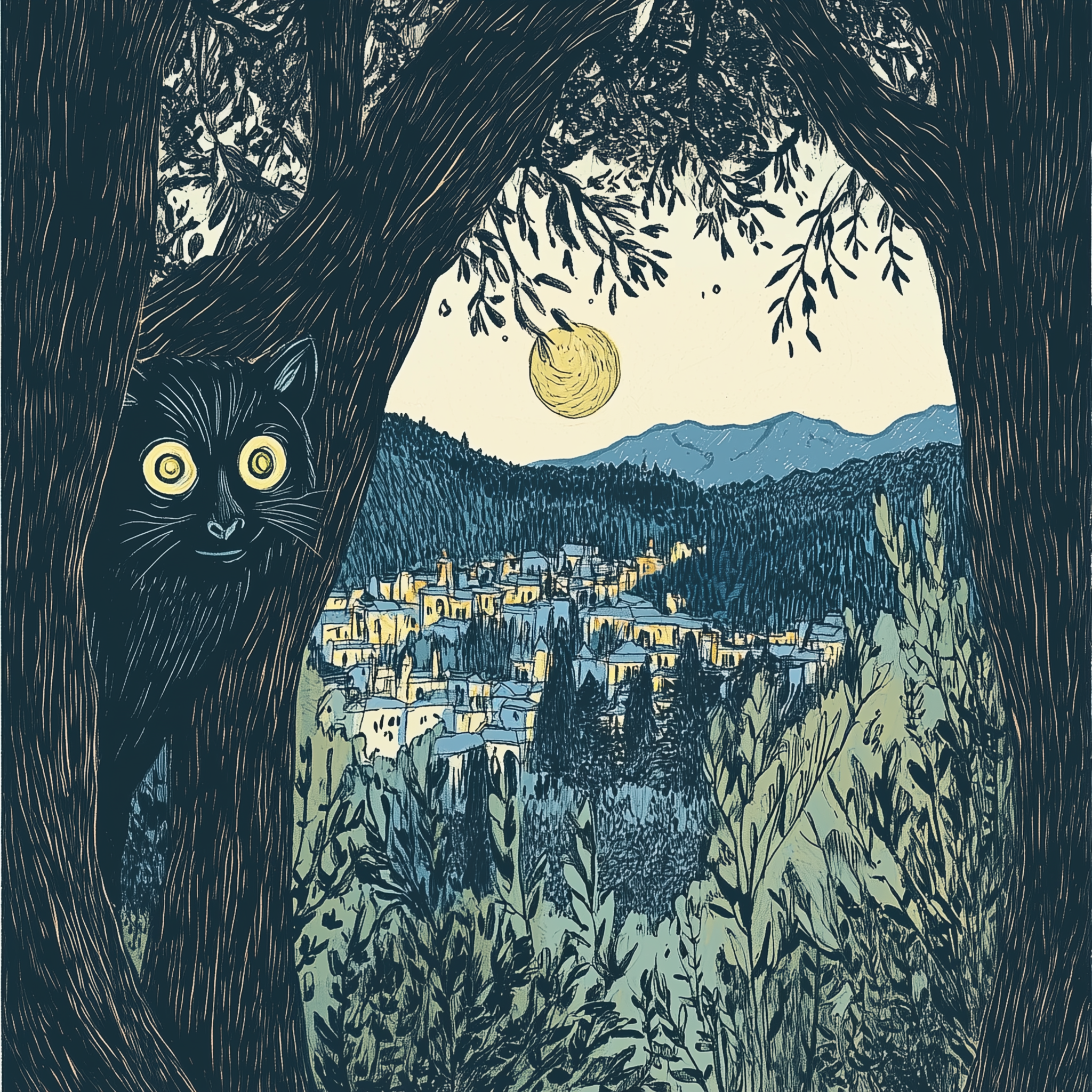
The principal chain of the Vindhias was crossed by eight in the evening, and another halt was made on the northern slope, in a ruined bungalow. They had gone nearly twenty-five miles that day, and an equal distance still separated them from the station of Allahabad.
The night was cold. The Parsee lit a fire in the bungalow with a few dry branches, and the warmth was very grateful, provisions purchased at Kholby sufficed for supper, and the travellers ate ravenously. The conversation, beginning with a few disconnected phrases, soon gave place to loud and steady snores. The guide watched Kiouni, who slept standing, bolstering himself against the trunk of a large tree. Nothing occurred during the night to disturb the slumberers, although occasional growls from panthers and chatterings of monkeys broke the silence; the more formidable beasts made no cries or hostile demonstration against the occupants of the bungalow. Sir Francis slept heavily, like an honest soldier overcome with fatigue. Passepartout was wrapped in uneasy dreams of the bouncing of the day before. As for Mr. Fogg, he slumbered as peacefully as if he had been in his serene mansion in Saville Row.
25 | Morning Journey Towards Allahabad
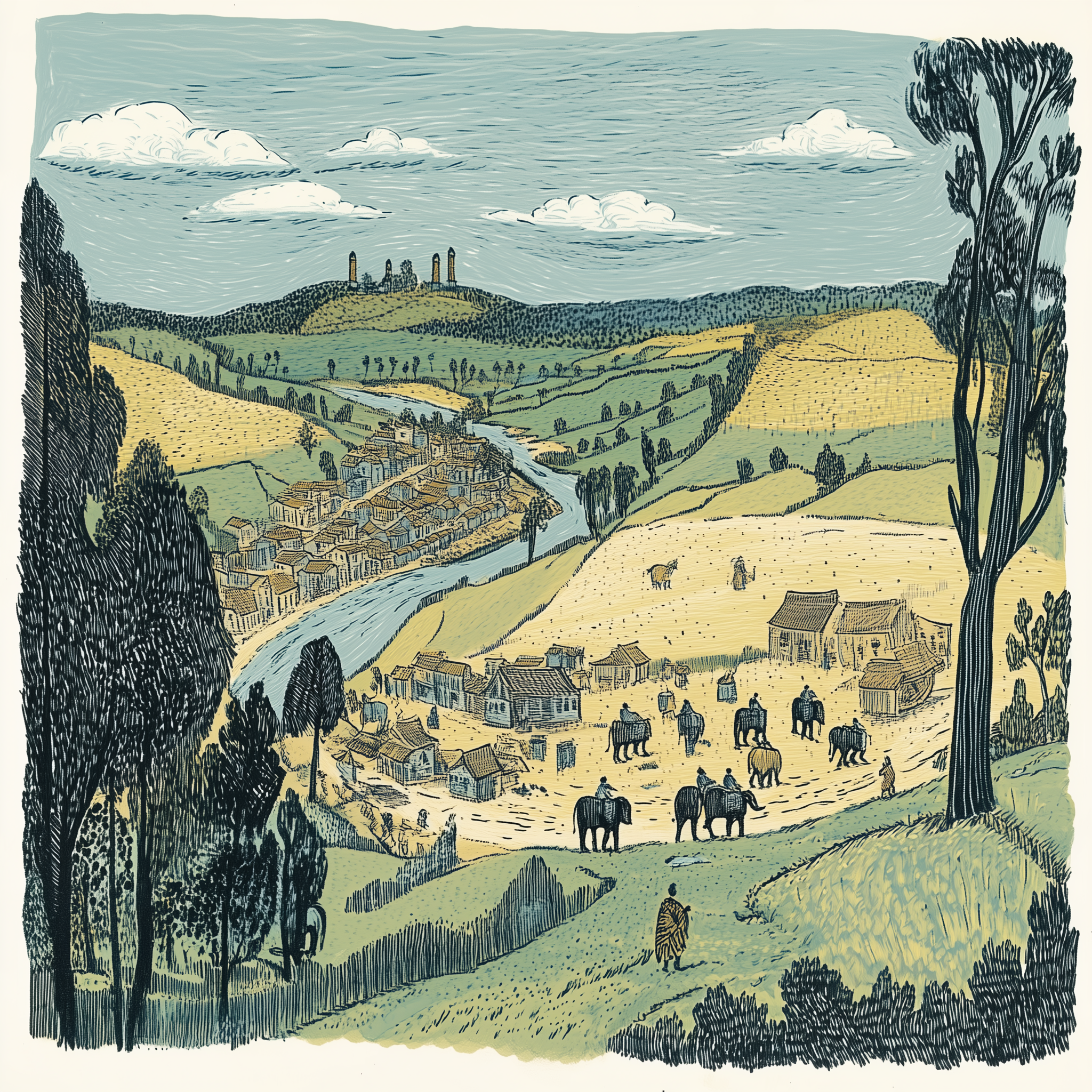
The journey was resumed at six in the morning; the guide hoped to reach Allahabad by evening. In that case, Mr. Fogg would only lose a part of the forty-eight hours saved since the beginning of the tour. Kiouni, resuming his rapid gait, soon descended the lower spurs of the Vindhias, and towards noon they passed by the village of Kallenger, on the Cani, one of the branches of the Ganges. The guide avoided inhabited places, thinking it safer to keep the open country, which lies along the first depressions of the basin of the great river. Allahabad was now only twelve miles to the north-east. They stopped under a clump of bananas, the fruit of which, as healthy as bread and as succulent as cream, was amply partaken of and appreciated.
26 | Discovery of the Procession
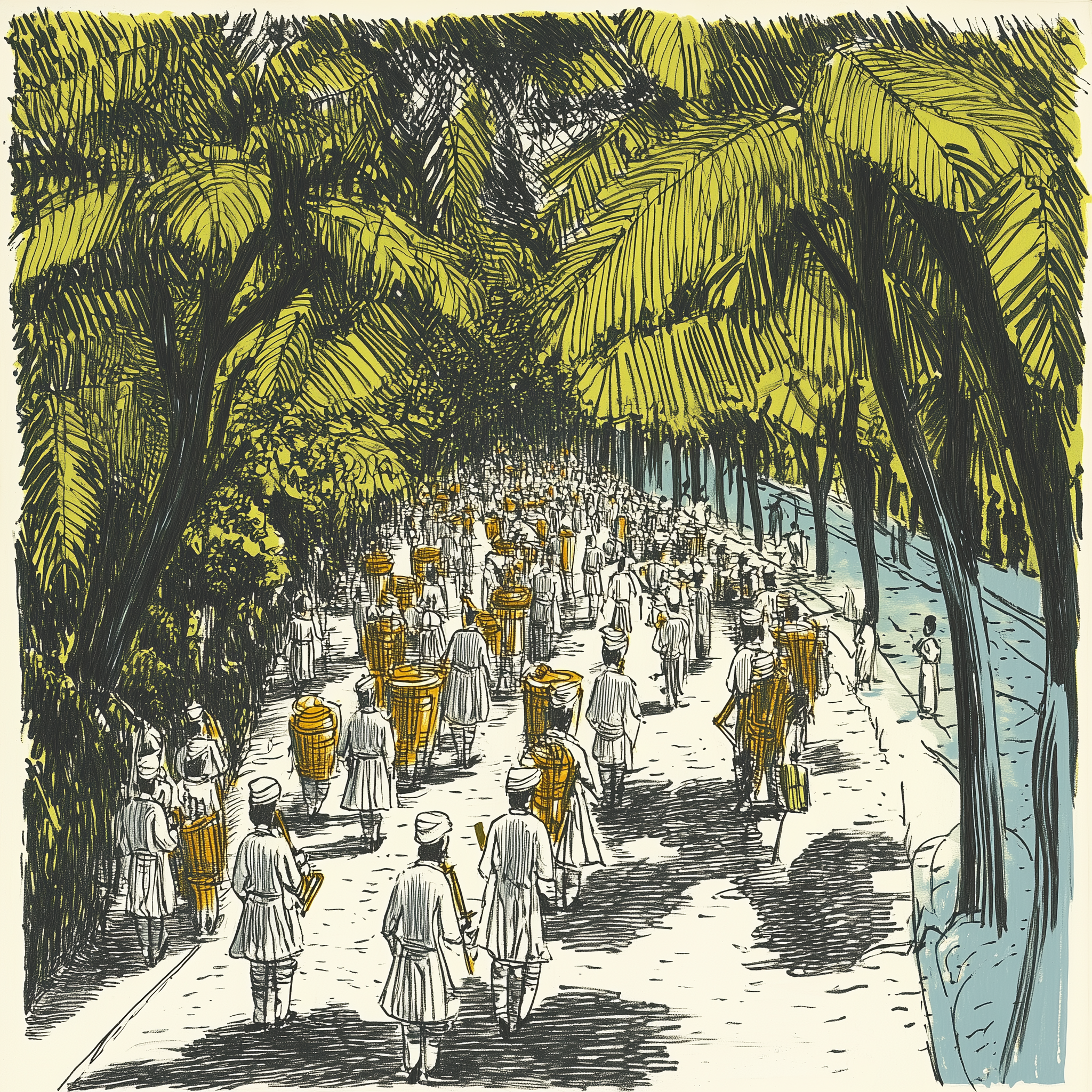
At two o'clock the guide entered a thick forest which extended several miles; he preferred to travel under cover of the woods. They had not as yet had any unpleasant encounters, and the journey seemed on the point of being successfully accomplished, when the elephant, becoming restless, suddenly stopped.
It was then four o'clock.
“*What's the matter?*” asked Sir Francis, putting out his head.
“*I don't know, officer,*” replied the Parsee, listening attentively to a confused murmur which came through the thick branches.
The murmur soon became more distinct; it now seemed like a distant concert of human voices accompanied by brass instruments. Passepartout was all eyes and ears. Mr. Fogg patiently waited without a word. The Parsee jumped to the ground, fastened the elephant to a tree, and plunged into the thicket. He soon returned, saying:
“*A procession of Brahmins is coming this way. We must prevent their seeing us, if possible.*”
The guide unloosed the elephant and led him into a thicket, at the same time asking the travellers not to stir. He held himself ready to bestride the animal at a moment's notice, should flight become necessary; but he evidently thought that the procession of the faithful would pass without perceiving them amid the thick foliage, in which they were wholly concealed.
27 | The Procession of Kali
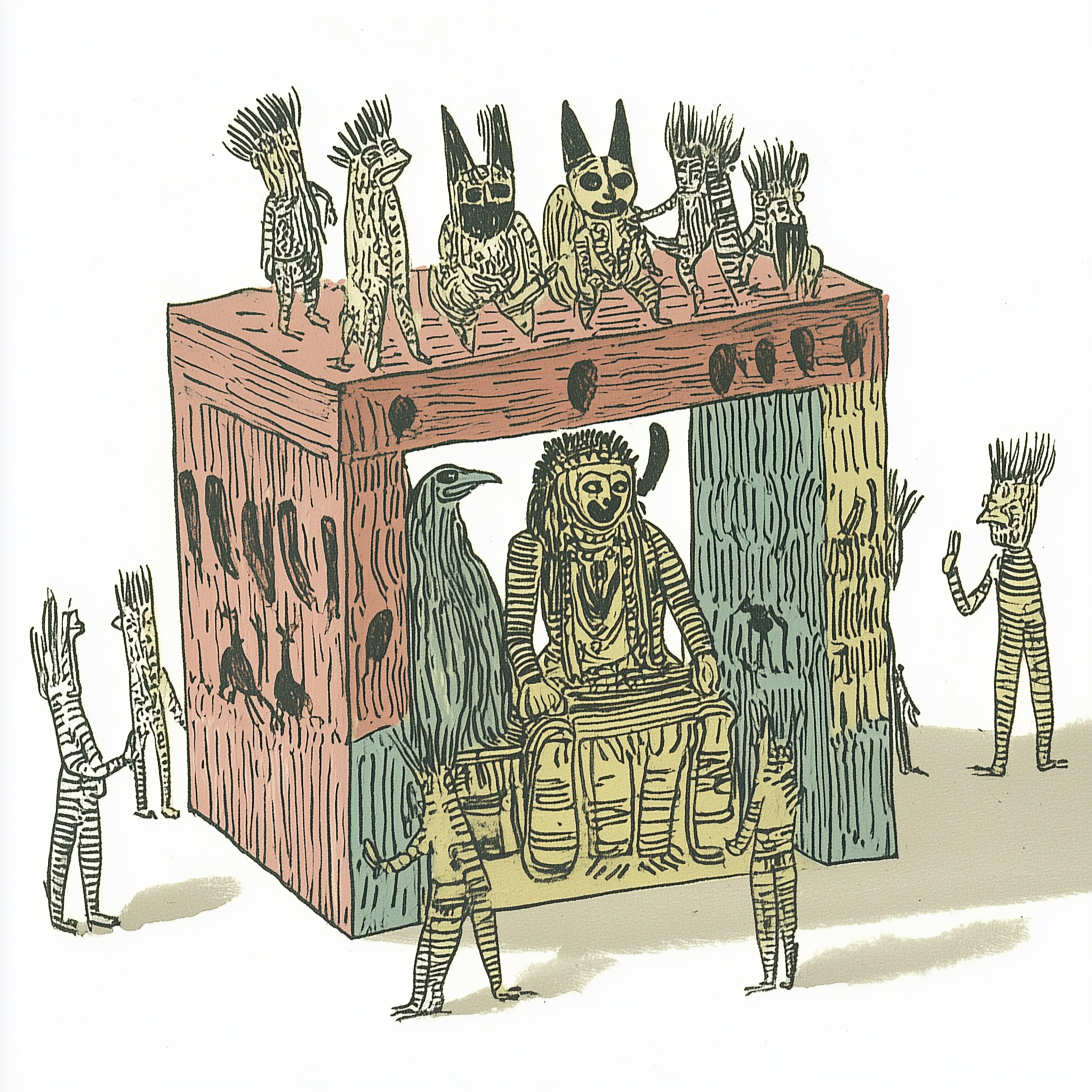
The discordant tones of the voices and instruments drew nearer, and now droning songs mingled with the sound of the tambourines and cymbals. The head of the procession soon appeared beneath the trees, a hundred paces away; and the strange figures who performed the religious ceremony were easily distinguished through the branches. First came the priests, with mitres on their heads, and clothed in long lace robes. They were surrounded by men, women, and children, who sang a kind of lugubrious psalm, interrupted at regular intervals by the tambourines and cymbals; while behind them was drawn a car with large wheels, the spokes of which represented serpents entwined with each other. Upon the car, which was drawn by four richly caparisoned zebus, stood a hideous statue with four arms, the body coloured a dull red, with haggard eyes, dishevelled hair, protruding tongue, and lips tinted with betel. It stood upright upon the figure of a prostrate and headless giant.
Sir Francis, recognising the statue, whispered, “*The goddess Kali; the goddess of love and death.*”
“*Of death, perhaps,*” muttered back Passepartout, “*but of love—that ugly old hag? Never!*”
The Parsee made a motion to keep silence.
A group of old fakirs were capering and making a wild ado round the statue; these were striped with ochre, and covered with cuts whence their blood issued drop by drop—stupid fanatics, who, in the great Indian ceremonies, still throw themselves under the wheels of Juggernaut. Some Brahmins, clad in all the sumptuousness of Oriental apparel, and leading a woman who faltered at every step, followed. This woman was young, and as fair as a European. Her head and neck, shoulders, ears, arms, hands, and toes were loaded down with jewels and gems with bracelets, earrings, and rings; while a tunic bordered with gold, and covered with a light muslin robe, betrayed the outline of her form.
The guards who followed the young woman presented a violent contrast to her, armed as they were with naked sabres hung at their waists, and long damascened pistols, and bearing a corpse on a palanquin. It was the body of an old man, gorgeously arrayed in the habiliments of a rajah, wearing, as in life, a turban embroidered with pearls, a robe of tissue of silk and gold, a scarf of cashmere sewed with diamonds, and the magnificent weapons of a Hindoo prince. Next came the musicians and a rearguard of capering fakirs, whose cries sometimes drowned the noise of the instruments; these closed the procession.
28 | The Revelation of the Suttee
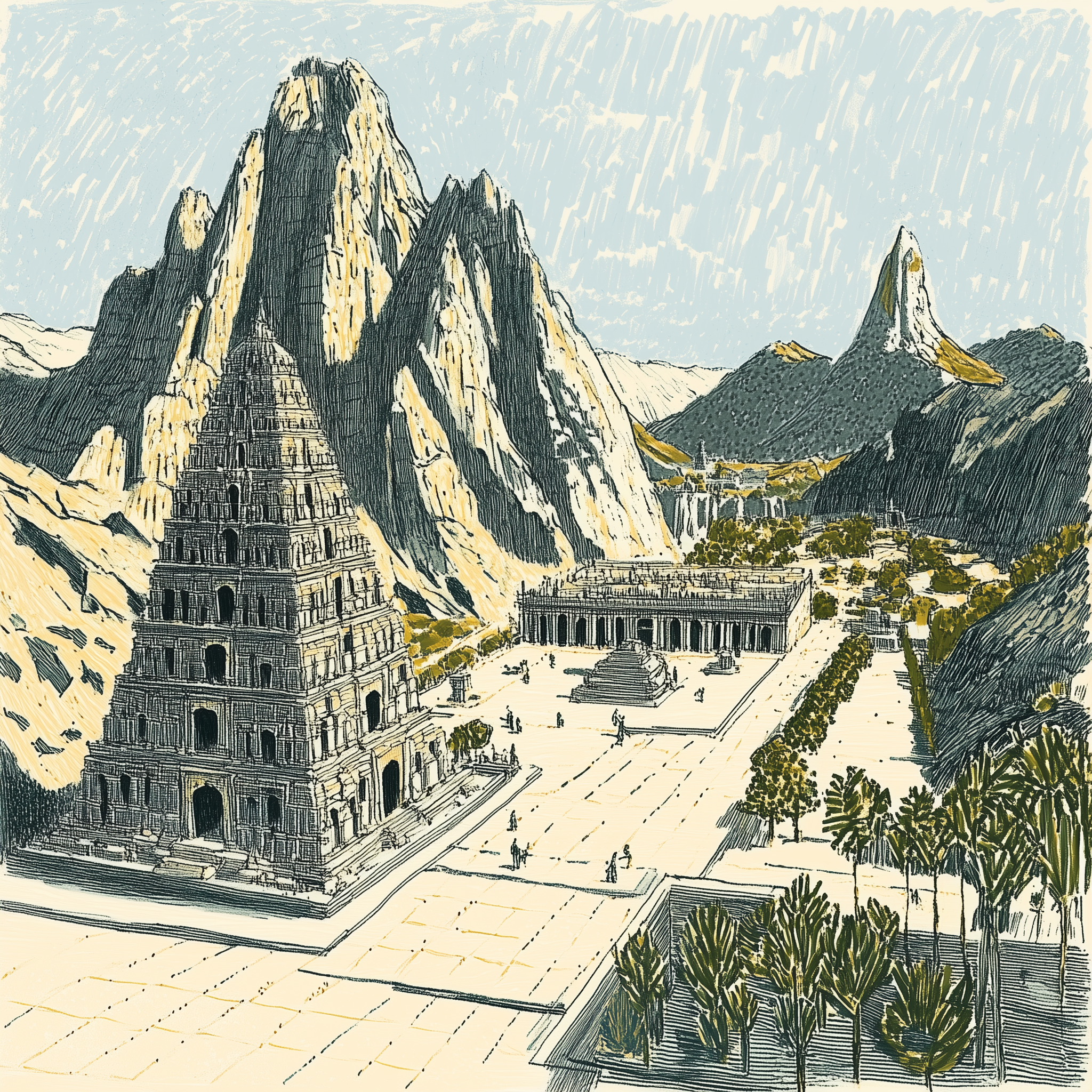
Sir Francis watched the procession with a sad countenance, and, turning to the guide, said, “A suttee.”
The Parsee nodded, and put his finger to his lips. The procession slowly wound under the trees, and soon its last ranks disappeared in the depths of the wood. The songs gradually died away; occasionally cries were heard in the distance, until at last all was silence again.
Phileas Fogg had heard what Sir Francis said, and, as soon as the procession had disappeared, asked: “*What is a suttee?*”
“*A suttee,*” returned the general, “*is a human sacrifice, but a voluntary one. The woman you have just seen will be burned to-morrow at the dawn of day.*”
“*Oh, the scoundrels!*” cried Passepartout, who could not repress his indignation.
“*And the corpse?*” asked Mr. Fogg.
“*Is that of the prince, her husband,*” said the guide; “*an independent rajah of Bundelcund.*”
“*Is it possible,*” resumed Phileas Fogg, his voice betraying not the least emotion, “*that these barbarous customs still exist in India, and that the English have been unable to put a stop to them?*”
“*These sacrifices do not occur in the larger portion of India,*” replied Sir Francis; “*but we have no power over these savage territories, and especially here in Bundelcund. The whole district north of the Vindhias is the theatre of incessant murders and pillage.*”
“*The poor wretch!*” exclaimed Passepartout, “*to be burned alive!*”
“*Yes,*” returned Sir Francis, “*burned alive. And, if she were not, you cannot conceive what treatment she would be obliged to submit to from her relatives. They would shave off her hair, feed her on a scanty allowance of rice, treat her with contempt; she would be looked upon as an unclean creature, and would die in some corner, like a scurvy dog. The prospect of so frightful an existence drives these poor creatures to the sacrifice much more than love or religious fanaticism. Sometimes, however, the sacrifice is really voluntary, and it requires the active interference of the Government to prevent it. Several years ago, when I was living at Bombay, a young widow asked permission of the governor to be burned along with her husband's body; but, as you may imagine, he refused. The woman left the town, took refuge with an independent rajah, and there carried out her self-devoted purpose.*”
29 | The Plan to Save the Woman
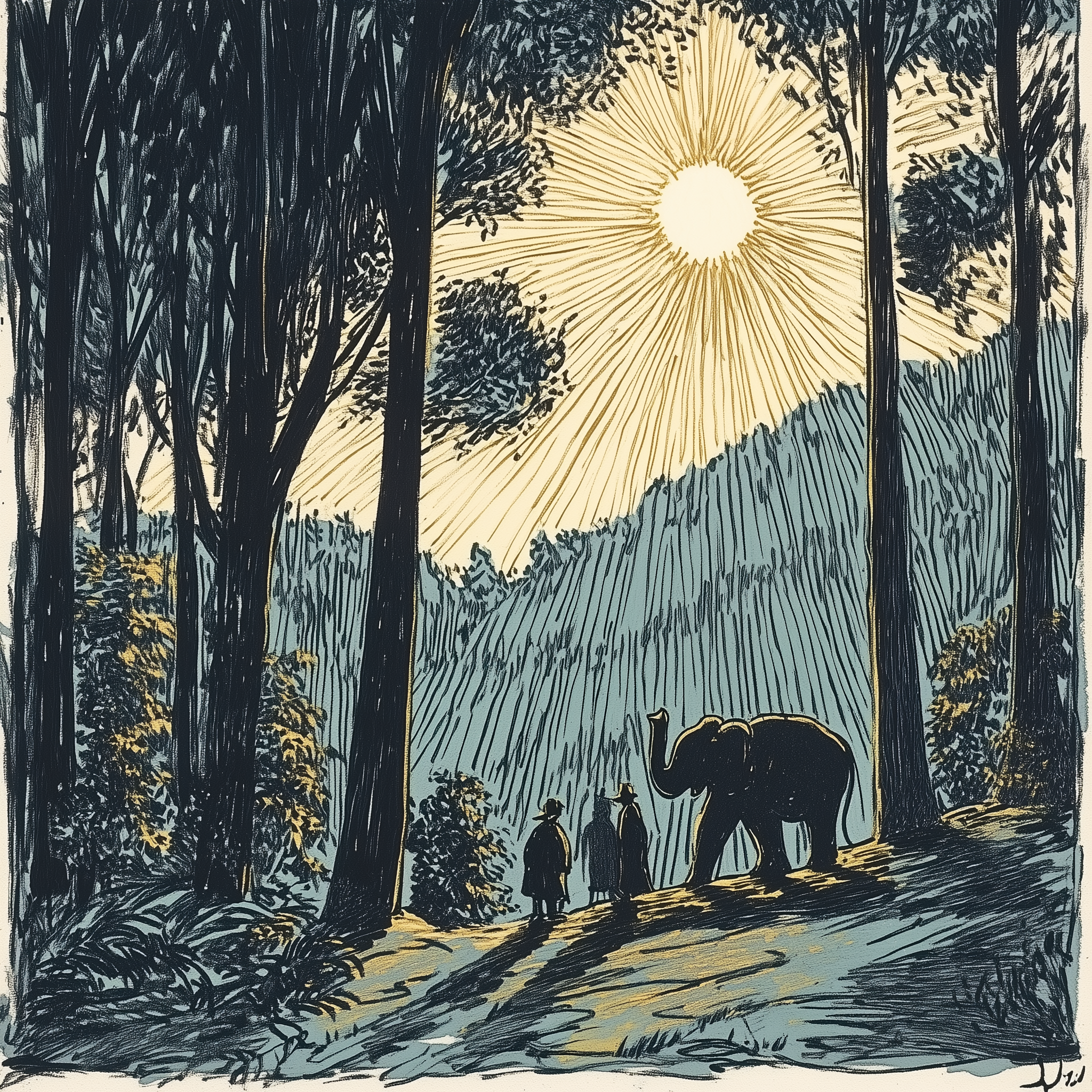
While Sir Francis was speaking, the guide shook his head several times, and now said: “The sacrifice which will take place to-morrow at dawn is not a voluntary one.”
“*How do you know?*”
“*Everybody knows about this affair in Bundelcund.*”
“*But the wretched creature did not seem to be making any resistance,*” observed Sir Francis.
“*That was because they had intoxicated her with fumes of hemp and opium.*”
“*But where are they taking her?*”
“*To the pagoda of Pillaji, two miles from here; she will pass the night there.*”
“*And the sacrifice will take place—*”
“*To-morrow, at the first light of dawn.*”
The guide now led the elephant out of the thicket, and leaped upon his neck. Just at the moment that he was about to urge Kiouni forward with a peculiar whistle, Mr. Fogg stopped him, and, turning to Sir Francis Cromarty, said, “*Suppose we save this woman.*”
“*Save the woman, Mr. Fogg!*”
“*I have yet twelve hours to spare; I can devote them to that.*”
“*Why, you are a man of heart!*”
“*Sometimes,*” replied Phileas Fogg, quietly; “*when I have the time.*”
30 | Introduce a fresh character or unexpected event that propels the narrative

As the group discussed their daring plan to save the woman from the suttee, a rustling in the nearby bushes caught their attention. Suddenly, a disheveled young man burst into their small clearing, his clothes torn and his face marked with scratches. He was panting heavily, his eyes wide with fear and desperation.
“Please, you must help me!” he gasped, looking frantically at the surprised travelers. “I am Arjun, the woman's brother. I've been following the procession, trying to find a way to save my sister. They took her against her will!”
This unexpected arrival added a new dimension to the rescue plan. Arjun could provide invaluable inside information about the temple and the rituals, potentially increasing their chances of success. However, his emotional state and the risk of discovery also complicated matters.
Mr. Fogg regarded the newcomer with his characteristic calm, while Sir Francis and Passepartout exchanged concerned glances. The Parsee guide looked warily at Arjun, assessing whether he could be trusted.
“Tell us everything you know,” Fogg said evenly. “We were just discussing a plan to intervene.”
31 | A character discovers or utilizes unique talents to influence events.
As Arjun caught his breath and began to share details about the temple and the upcoming ritual, Passepartout suddenly perked up, an idea forming in his mind.
“Monsieur Fogg,” he said excitedly, “I believe I can be of particular use in this rescue mission!”
All eyes turned to the French valet, who was now practically bouncing with enthusiasm.
“You see, before I entered your service, I spent several years as a performer in a traveling circus. I was an acrobat and a master of disguise!” Passepartout explained, his eyes twinkling. “I can use these skills to infiltrate the temple, perhaps even pose as one of the priests or guards.”
Mr. Fogg raised an eyebrow, intrigued by this revelation. Sir Francis nodded approvingly, while Arjun looked at Passepartout with newfound hope.
“Indeed, Passepartout,” Fogg said, “your talents may prove invaluable. What do you propose?”
Passepartout grinned, already formulating a plan. “With some fabric from our supplies and a bit of creativity, I can fashion a convincing disguise. I can move silently and, if needed, perform acrobatic feats to access restricted areas of the temple. This could allow me to get close to the woman and create a diversion while you and the others execute the main rescue.”
The Parsee guide, impressed by Passepartout's initiative, added, “I know where we can find some saffron robes that would be perfect for a priestly disguise. There's an abandoned shrine not far from here.”
Mr. Fogg nodded, his normally impassive face showing a hint of approval. “Very well, Passepartout. Your circus skills may be just what we need to turn the odds in our favor. Let's refine this plan and prepare for tonight's rescue mission.”
With renewed energy and hope, the group huddled together, incorporating Passepartout's unique abilities into their
32 | Reveal hidden knowledge or introduce a mysterious guide.
As the group continued to refine their rescue plan, the Parsee guide suddenly stiffened, his eyes fixed on a point beyond the clearing. He raised a hand, signaling for silence.
“We are not alone,” he whispered.
From the shadows of the dense jungle emerged an elderly woman, her silver hair gleaming in the dappled sunlight. She moved with surprising grace for her age, her eyes bright with wisdom and purpose. Her sari was adorned with intricate patterns that seemed to shimmer and change as she approached.
“I am Indira,” she announced in a calm, clear voice. “I have been expecting you.”
The group exchanged bewildered glances. Mr. Fogg, ever composed, stepped forward. “Madam, how did you know of our presence here?”
Indira smiled mysteriously. “I am a keeper of ancient knowledge, a guardian of balance in these lands. The winds whispered of your coming, and of your noble intention.”
She turned to Arjun, her eyes softening. “Young man, your sister's fate is not yet sealed. There is an old secret passage beneath the temple of Pillaji, known only to a few. It was used centuries ago to rescue those unjustly condemned.”
Arjun's eyes widened with hope, while the others listened intently.
Indira continued, “I can guide you to the entrance of this passage. But be warned, it is guarded by more than just men. Ancient magics and forgotten spirits lurk in those depths.”
The Parsee guide nodded respectfully. “I have heard whispers of such passages, but thought them merely legends.”
Mr. Fogg, practical as ever, asked, “How does this change our plan, madam?”
Indira's eyes twinkled. “It offers you a path unseen, a way to strike at the heart of the temple without raising immediate alarm. But it will require courage, for the unknown can be more terrifying than any mortal danger.”
As the group absorbed this new information, they realized that their rescue mission had just taken on a new, mystical dimension. The hidden passage offered hope, but also unknown perils. They would need to decide whether to trust this mysterious guide and brave the ancient secrets beneath the temple.
33 | Develop romantic subplots or pivotal decisions affecting alliances.
As the group contemplated Indira's revelation about the secret passage, a palpable tension arose between Arjun and the Parsee guide. Their eyes met, and a spark of recognition flashed between them.
“Vijay?” Arjun whispered, his voice a mix of surprise and conflicting emotions.
The Parsee guide, now identified as Vijay, nodded slowly. “It's been a long time, Arjun.”
The others looked on, puzzled by this unexpected development. Passepartout, ever curious, couldn't help but ask, “You two know each other?”
Arjun's face darkened. “We were once close friends… and more. But Vijay left our village years ago, choosing to abandon our ways.”
Vijay's expression was pained. “I left to escape the rigid traditions that threatened to suffocate us both, Arjun. I never thought I'd see you again, let alone in these circumstances.”
The air crackled with unresolved feelings and past regrets. Mr. Fogg, sensing the delicate situation, intervened. “Gentlemen, whatever your history, we must focus on the task at hand. The lady's life is at stake.”
Indira, watching the exchange with knowing eyes, spoke softly. “Sometimes, fate brings us full circle to face what we left behind. Your shared past may be the key to this rescue.”
Arjun and Vijay exchanged long looks, years of unspoken words passing between them. Finally, Arjun extended his hand. “For my sister's sake, can we set aside our past and work together?”
Vijay grasped Arjun's hand firmly. “For her sake, and perhaps… for our own.”
This reconciliation seemed to shift the energy of the group. Sir Francis nodded approvingly, while Passepartout couldn't help but smile at the unexpected turn of events.
Mr. Fogg, ever practical, brought the focus back to their mission. “Now that we have this new information and… renewed alliances, we must decide our course of action. Do we trust in Indira's knowledge and brave the secret passage, or do we stick to our original plan?”
The group looked at one another, weighing the risks and potential
34 | Propel the story forward with decisive actions or a quest.
Mr. Fogg, after a moment of contemplation, made his decision. “We shall use the secret passage,” he declared firmly. “The element of surprise may be our greatest advantage.”
The others nodded in agreement, their faces a mix of determination and apprehension.
“Then we must move swiftly,” Indira urged. “The night grows short, and the dawn brings with it the threat of death.”
With renewed purpose, the group sprang into action. Passepartout quickly donned his hastily crafted disguise, transforming himself into a convincing facsimile of a local holy man. Arjun and Vijay, their past differences set aside, worked together to gather supplies and plan their approach to the temple.
As they prepared to depart, Indira placed her hand on a nearby tree trunk and muttered something under her breath. To everyone's amazement, a section of the trunk seemed to shimmer and then slide away, revealing a narrow, dark passage.
“This will lead you to the underground network beneath the temple,” Indira explained. “But remember, the path is treacherous and guarded by more than mere mortals.”
Mr. Fogg nodded gravely. “We understand the risks, madam. Thank you for your assistance.”
With a final check of their equipment and a shared look of resolve, the group entered the passage one by one. Passepartout, in his priestly disguise, would approach the temple from above ground as a distraction, while the others navigated the secret tunnels below.
As they delved deeper into the earth, the air grew thick with age and mystery. Strange symbols glowed faintly on the walls, and distant echoes suggested they were not alone in these ancient corridors.
Vijay, leading the way with a torch, suddenly halted. “There's a fork ahead,” he whispered. “Indira didn't mention this.”
Before them lay two diverging paths, each disappearing into darkness. One emanated a faint, eerie blue glow, while the other seemed to whisper with an unseen breeze.
“We must choose quickly,” Sir Francis urged, aware of the passing time.
Mr. Fogg, his face illuminated by the flickering torchlight, looked at his companions. "This is where our quest truly
35 | Introduce unexpected turns or shifts in the storyline.
As the group stood at the fork, deliberating which path to take, a low rumble echoed through the tunnel. Suddenly, the ground beneath their feet began to shake violently.
“Earthquake!” Sir Francis shouted, struggling to maintain his balance.
The tremors intensified, and chunks of rock started falling from the ceiling. In the chaos, Arjun stumbled and fell towards the path with the eerie blue glow. Vijay, acting on instinct, lunged to grab him, but both men tumbled into the glowing passage.
“Arjun! Vijay!” Mr. Fogg called out, but his voice was drowned by the roar of shifting earth.
Before the others could react, a massive slab of stone crashed down, sealing off the blue passage and separating the group. As quickly as it had begun, the earthquake subsided, leaving Mr. Fogg, Sir Francis, and the Parsee guide trapped on one side, with Arjun and Vijay presumably on the other.
Meanwhile, above ground, Passepartout, who had been approaching the temple in his disguise, found himself in the midst of unexpected chaos. The earthquake had caused panic among the priests and guards, who were now frantically trying to secure the temple and its precious idols. In the confusion, Passepartout noticed something startling – the woman they had come to rescue was being hurriedly moved by a small group of priests, away from the main temple complex.
Back in the tunnel, Mr. Fogg quickly assessed their new situation. “We must press on,” he said firmly. “We can only hope Arjun and Vijay find another way to the temple.”
As they continued down the remaining path, the whispering breeze grew stronger, carrying with it fragments of ghostly voices and glimpses of shadowy figures that vanished when looked at directly.
Suddenly, the tunnel opened into a vast underground chamber. At its center stood an ancient stone dias, upon which rested a shimmering, translucent orb. The whispers grew louder, seeming to emanate from the orb itself.
The Parsee guide's eyes widened in recognition. “The Orb of Destiny,” he breathed. "I thought it was just a legend. It's said to show glimpses
36 | Resolve conflicts or address moral dilemmas.
The Parsee guide's voice trembled with awe as he continued, “The Orb of Destiny is said to show glimpses of possible futures, but at a great cost. Those who gaze into it must face their deepest fears and make a choice that will alter their fate forever.”
Mr. Fogg, ever pragmatic, approached the dias. “If this orb can show us the future, perhaps it can reveal the safest path to rescue the woman and reunite with our companions.”
Sir Francis placed a cautionary hand on Fogg's arm. “But at what cost, Phileas? Are we prepared to face the consequences of such knowledge?”
As they debated, the orb pulsed with an otherworldly light, seeming to beckon them. The whispers grew more insistent, echoing around the chamber.
Mr. Fogg stood silent for a moment, then spoke with resolve. “We set out on this journey to save a life. If gazing into this orb can help us achieve that goal, then the risk is mine to take.”
Before anyone could object, Fogg stepped forward and placed his hands on the orb. Immediately, his body went rigid, his eyes wide and unfocused as visions flashed before him:
He saw multiple futures unfolding - one where they successfully rescued the woman but at the cost of Passepartout's life; another where they failed in their mission but all survived; and a third where they saved the woman and all lived, but Fogg himself was forever changed, losing his stolid demeanor and precise way of life.
As the visions faded, Fogg stumbled back, visibly shaken for the first time in their journey. The Parsee guide and Sir Francis steadied him, concern etched on their faces.
“What did you see?” Sir Francis asked urgently.
Fogg, his voice hoarse, replied, “I saw… choices. Terrible choices.”
He quickly relayed the visions to his companions. A heavy silence fell over the group as they grappled with the weight of this knowledge.
Sir Francis spoke first, his voice grave. “We cannot willingly sacrifice Passepartout, nor can we abandon our mission. But Phileas, are you prepared to lose the very essence of who you are?”
Fogg
37 | Resolve conflicts or address moral dilemmas.
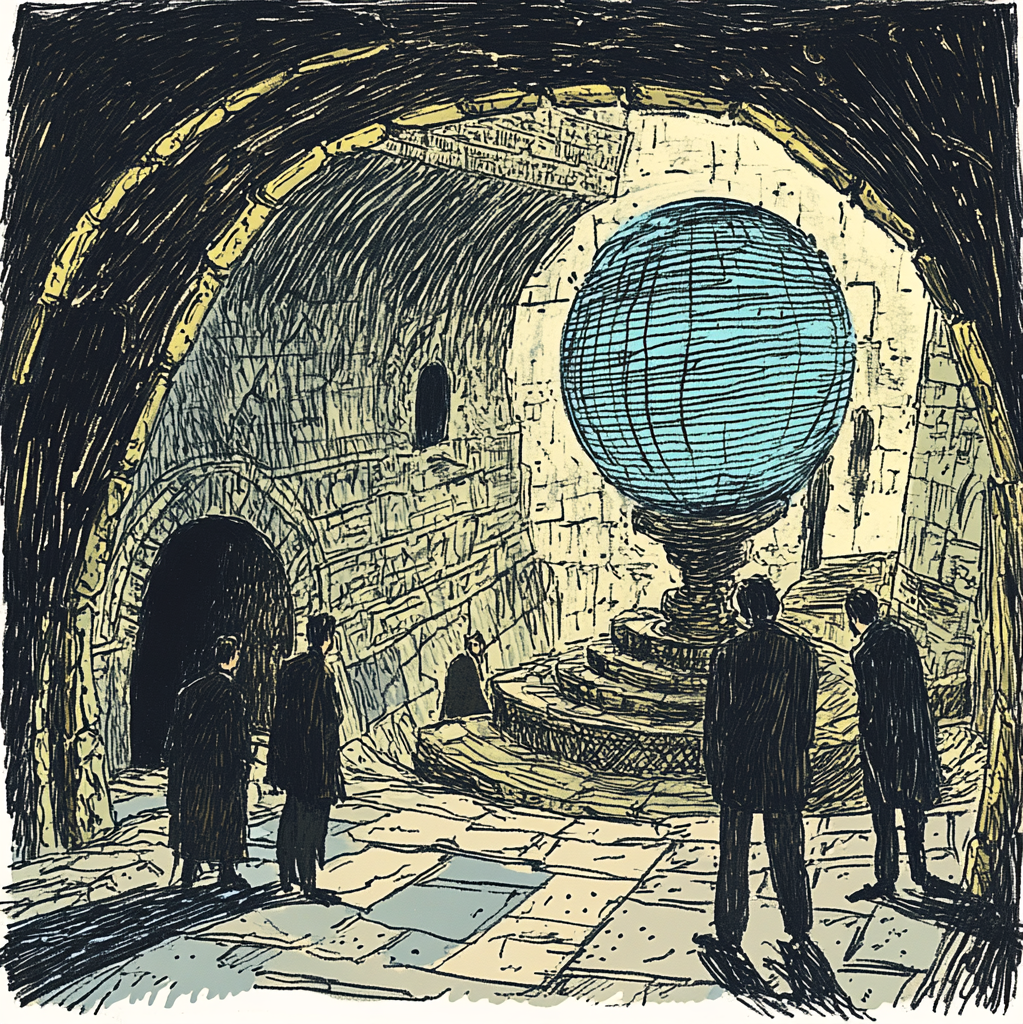
Fogg straightened his collar, a gesture that seemed to help him regain his composure. “The essence of who I am,” he said slowly, “is not merely my routines and preciseness. It is also the choice to do what is right, regardless of personal cost.”
The orb pulsed again, as if responding to his words. The Parsee guide nodded solemnly. “You understand then, Mr. Fogg, that once this choice is made, there is no returning to who you were?”
“I have spent my life measuring every minute, calculating every action,” Fogg replied, his voice gaining strength. “But what is the value of such precision if not used in service of saving an innocent life? Perhaps this is not a loss, but an evolution.”
Sir Francis smiled warmly at his friend. “Well said, Phileas. Then we proceed with the third path - to save both the woman and ourselves, though it changes us all.”
Just then, they heard distant shouts echoing through the tunnel - Passepartout's voice, urgent and clear: “Monsieur Fogg! The ceremony has been moved forward! They plan to conduct the ritual immediately due to the earthquake, which they view as an omen!”
The time for philosophical debate was over. Fogg's eyes hardened with determination. “We move now. Whatever changes come, we face them together.”
The Parsee guide quickly consulted his knowledge of the temple layout. “There's a passage behind the orb that leads directly to the ceremonial chamber. We can still reach them in time.”
As they hurried toward the hidden passage, Fogg paused for one last look at the orb. Its glow had dimmed, but the whispers remained, reminding him of the choice he'd made. He was choosing humanity over precision, compassion over routine, chaos over order.
“Time to abandon schedules,” he murmured, a slight smile playing at his lips, “and embrace the unpredictable.”
38 | Restore equilibrium after chaos or blend opposing elements.

In the ceremonial chamber above, chaos reigned as Passepartout, still in his priestly disguise, cleverly sowed confusion among the real priests. Meanwhile, through the secret passage, Fogg and his companions emerged behind the temple's main altar, just as Arjun and Vijay burst in from another hidden entrance, their clothes covered in luminescent blue powder from their separate underground journey.
The reunion was brief but powerful - a quick exchange of nods conveying both relief and readiness. The woman, already positioned for the ceremony, was surrounded by chanting priests who seemed oblivious to the earthquake's warning and the mounting disorder around them.
Mr. Fogg, drawing upon his newfound embrace of spontaneity, did something entirely unexpected. He stepped forward into the torchlight and spoke in a commanding voice: “The gods themselves have spoken!”
All eyes turned to him, and in that moment of surprise, several things happened at once: Passepartout released carefully concealed smoke pellets, Arjun and Vijay's blue-stained appearance created an otherworldly effect in the smoke, and Sir Francis positioned himself by the exit.
“The earth shook because this sacrifice is not ordained,” Fogg continued, his precise British accent lending an unusual authority to his words. “The ancient spirits of the tunnels below have risen in protest!”
The Parsee guide, catching on, added his own voice in his native tongue, translating and embellishing Fogg's proclamation. The priests, already unnerved by the earthquake and now faced with these strange occurrences, began to waver.
The woman, clear-headed now as the opium's effects wore off, seized her moment and rose with dignity. “I choose life,” she declared firmly, “as the gods have shown us today.”
In that moment, something remarkable happened. Instead of chaos erupting, a strange calm descended. The head priest, who had been studying the unusual events with growing uncertainty, slowly nodded.
“Perhaps,” he said thoughtfully, “it is time we reconsidered some of our… traditions.”
As dawn broke over the temple, an unprecedented scene unfolded: priests and rescuers, British and Indians, traditionalists and progressives, all engaged in earnest discussion about change and preservation, about honoring the old while embracing the new.
Mr. Fogg checked his watch - a habitual gesture - then deliberately put it away. Some things, he had learned, couldn't be measured in minutes and seconds.
39 | Provide guidance or a glimmer of hope during difficult times.

As the group prepared to depart the temple, Indira appeared once again, seemingly materializing from the morning mist. Her presence brought a sense of calm completion to the tumultuous events.
“You have done more than save a life today,” she said, her eyes twinkling with wisdom. “You have planted seeds of change that will grow for generations to come.”
She approached the rescued woman, who was now embracing her brother Arjun, and placed a small medallion in her hand. “This amulet has been passed down through centuries, given to those who brave enough to forge new paths. Wear it as a reminder that tradition and progress need not be enemies, but can dance together like sun and moon.”
Turning to Mr. Fogg, she smiled knowingly. “And you, who came seeking only to win a wager, have found something far more valuable - the courage to let your heart guide your steps as well as your watch.”
Passepartout, still wearing parts of his priestly disguise, wiped tears from his eyes. “But what happens now, madame? How can we be sure these changes will last?”
Indira gestured to the rising sun, its rays painting the sky in brilliant hues of hope. “Look there - each dawn brings new possibilities. The priests who witnessed tonight's events will speak of them. Stories will spread. Questions will be asked. And in questioning, minds begin to open.”
The Parsee guide and Vijay stood close together, their renewed connection a testament to the night's transformative power. Sir Francis nodded appreciatively at the scene before him - British and Indian, East and West, old and new, all standing together in the morning light.
“Remember,” Indira continued, her voice carrying the weight of ancient wisdom, “that the greatest journeys are not measured in miles or minutes, but in the hearts transformed along the way.”
40 | Characters face past actions or make significant life decisions.
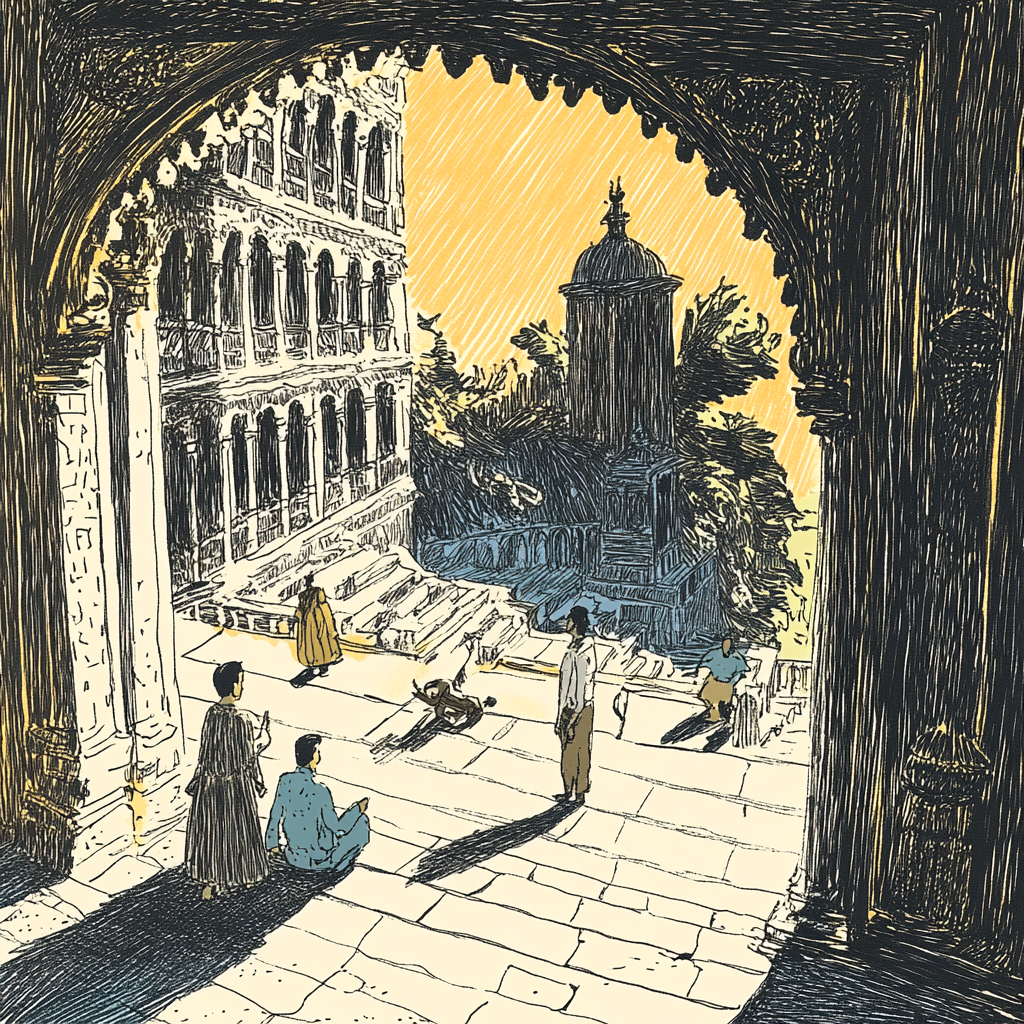
In the peaceful aftermath of the rescue, each member of the group found themselves confronting profound personal revelations.
Mr. Fogg stood apart from the others, holding his pocket watch - his constant companion through years of methodical living. With deliberate movements, he opened its case and traced the numbers that had governed his life for so long. “Perhaps,” he mused aloud, “precision without purpose is merely empty ritual.”
Nearby, Arjun and Vijay sat on the temple steps, their shoulders touching lightly as they watched the sunrise. “I left because I feared our traditions would suffocate any chance of change,” Vijay confessed softly. “But now I see that staying and working for change requires more courage than leaving.”
“And I,” Arjun replied, “defended these traditions blindly until they nearly cost my sister's life. We both have much to learn about balance.”
Passepartout, removing the last vestiges of his disguise, approached his master. “Monsieur Fogg, when I joined your service, I thought I was leaving my old life behind. But it was those very skills from my past that helped us succeed today.”
Sir Francis, observing them all, shared his own reflection: “In my years serving the Crown in India, I've often stood aside, believing it wasn't my place to interfere with local customs. Perhaps neutrality, when faced with injustice, is its own form of wrong.”
The rescued woman, still holding Indira's medallion, spoke with quiet strength. “My death was meant to honor tradition, but my life will now serve a greater purpose - showing others there is another way.”
Indira, watching this moment of collective reflection, nodded approvingly. “The past shapes us, but never binds us. Each moment offers a choice to begin anew.”
41 | Conclude the narrative satisfactorily or begin a new journey.

As the morning sun climbed higher, Mr. Fogg consulted his watch one final time before making an unprecedented decision. “We have thirty-six hours before our train departs from Allahabad,” he announced. “For once, I suggest we use this time not for rushing onward, but for understanding what we've achieved here.”
The temple grounds had become a place of unexpected communion. The head priest, deeply moved by the night's events, invited them to participate in a different kind of ceremony - one of reconciliation and new beginnings. The smell of incense mingled with morning air as temple bells rang out across the valley.
“My journey around the world was meant to prove a point about schedules and precision,” Fogg reflected, accepting a cup of tea from a young acolyte. “Instead, it's teaching me about humanity's capacity for change.”
Passepartout beamed at his master's transformation. “Then perhaps, Monsieur Fogg, we are on two journeys - one around the world, and one into the heart?”
The rescued woman, now known as Priya, had begun working with the priests to document their discussions about modernizing traditions while preserving their sacred essence. Arjun and Vijay offered to stay behind temporarily, to help establish new protocols that would prevent future forced sacrifices.
Sir Francis, preparing to resume his duties, shook Fogg's hand warmly. “You came to win a wager, old friend, but you may have helped start a reformation.”
As they prepared to depart, Indira appeared one last time, her presence like a morning breeze. “Every end is a beginning,” she said cryptically. “And your greatest adventure still lies ahead.”
Fogg looked at his companions - Passepartout, whose talents had proven invaluable; the Parsee guide, whose knowledge had lit their way; and all the others whose lives had intertwined with theirs. He felt something he hadn't experienced in years: anticipation for the unknown.
“To Allahabad then,” he said, pocketing his watch, “but this time, we walk with our eyes open to the wonders around us.”
42 | Stepp outside
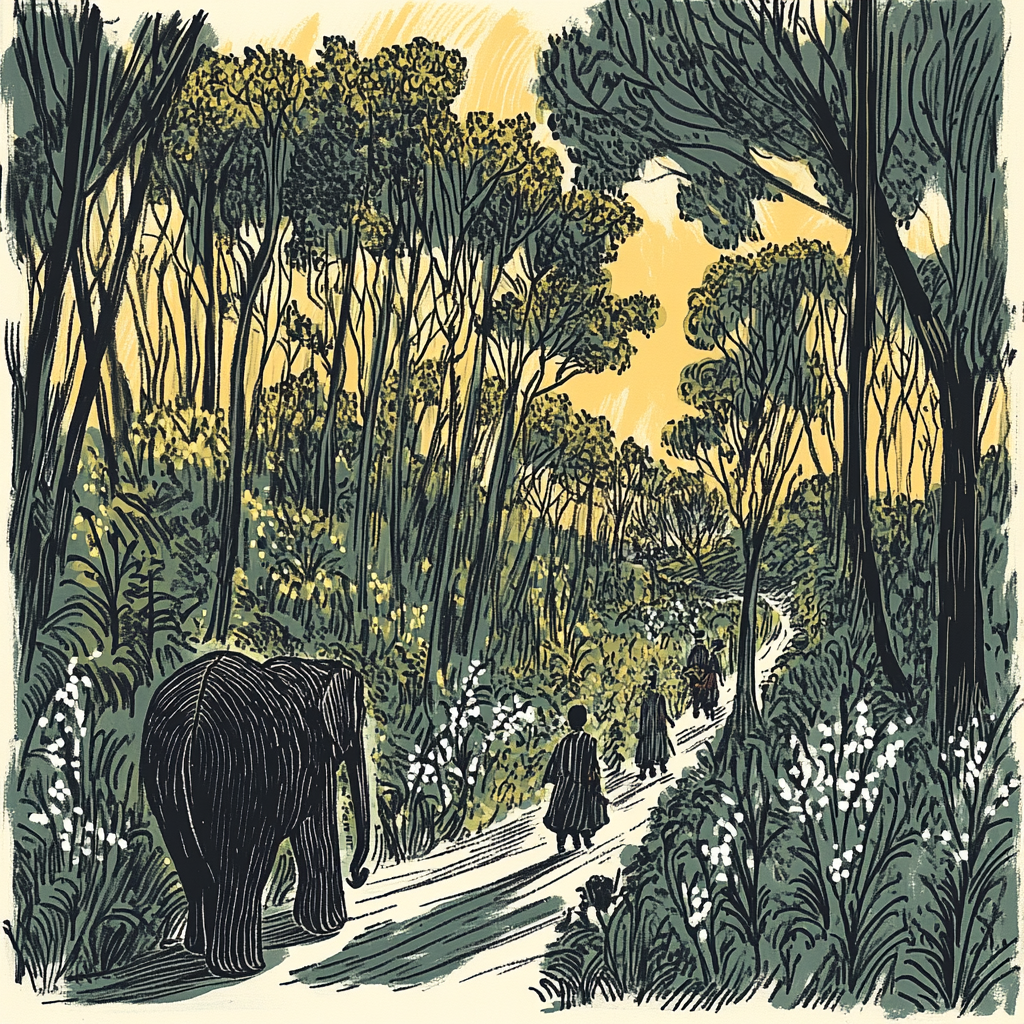
Stepping outside the temple grounds, the group was greeted by the vibrant colors of an Indian morning. Kiouni, their faithful elephant, stood patiently where they had left him, gently swaying in the morning breeze, adorned with morning dew.
“What shall become of our large friend?” Passepartout asked, patting the elephant's trunk affectionately. During their adventure, he had grown quite fond of the gentle giant.
Mr. Fogg studied the magnificent animal thoughtfully. “The original owner has been generously compensated,” he said. “I believe Kiouni would be of better service here, helping Arjun and Vijay with their new mission of reform.”
The elephant seemed to understand, letting out a soft trumpet of approval as Arjun approached with some fresh fruit. The morning air was filled with the sweet scent of jasmine and the distant calls of peacocks welcoming the day.
“The road to Allahabad awaits,” the Parsee guide announced, pointing to where the sun illuminated their path through the jungle. “Though perhaps this time, we might take the scenic route?”
Fogg smiled - a genuine, unguarded expression that transformed his usually stoic features. “Indeed. I find myself curious about these lands we're passing through. Passepartout, did you pack your sketchbook?”
“Oui, Monsieur!” his servant replied enthusiastically. “Shall I document our journey?”
“Please do. Some things are worth remembering beyond mere schedules and timetables.”
43 | Introduce unexpected turns or shifts in the storyline.

As the group prepared to depart, an explosion thundered from the railway line to Allahabad. Birds scattered as black smoke rose above the jungle.
“That's along our route,” the Parsee guide said gravely.
A breathless messenger arrived on horseback. “The bridge! The railway bridge over the gorge - destroyed by the Red Raja's bandits. They're demanding ransom from travelers!”
Mr. Fogg's plans seemed doomed. The railway was their only way to reach Allahabad in time.
Passepartout's eyes gleamed. “Monsieur Fogg, remember my circus days? I specialized in rigging across heights.”
The guide brightened. “There's an ancient rope bridge downstream, once used by priests…”
“Between my tools and local materials,” Passepartout said confidently, “we could repair it - right under the Raja's nose!”
Mr. Fogg checked his watch and nodded. “Tell me more about this plan.”
